










Dime” and various anti-Israel social media sites, is fiscally sponsored by the Pittsburgh Democratic Socialists of America.
Two challenges to the referendum were filed, one by the Jewish Federation of Greater Pittsburgh, joined by its President and CEO Jeff Finkelstein, Rabbi Seth Adelson, Cantor Laura Berman, Rabbi Daniel Fellman and Rabbi Yitzi Genack, and one by City Controller Rachael Heisler.
The city solicitor did not file a challenge nor did anyone from Pittsburgh City Council.
In a statement to the Chronicle, Pittsburgh Mayor Ed Gainey’s press secretary Olga George said the office was aware of the legislation “and it was sent to our law department for preliminary review.”
The petition filed by the controller challenges the legality of the referendum while Federation’s petition challenges both the

| Senior Sta Writer
Federation’s petition states that 15,253 signatures were collected but 10,387 of those are invalid for various reasons, including some signatories are not residents of Pittsburgh. It also challenges the validity of several of the circulators who collected signatures for the petition.
For both Federation and Heisler, the language of the proposed referendum is problematic. It reads:
“Shall the Pittsburgh Home Rule Charter be amended and supplemented by a new article prohibiting investment or allocation of public funds, including tax exemptions, to entities that conduct business operations with or in the state of Israel unless and until Israel ends its military action in Gaza, fully allows humanitarian assistance to reach the


he threat of war upon war hasn’t stopped Akiva Sunshine from training for cross-country. The incoming 11th grader at Hillel Academy of Pittsburgh is 6,000 miles away from his first WPIAL race and intends on completing every scheduled outdoor training run before the starter pistol fires.
Speaking by phone from Beit Meir, a moshav in central Israel, Sunshine told the Chronicle he’s spending the summer with NCSY Kollel, studying Torah, touring Israel and training for the upcoming cross-country season.
“I’m happy that I’m here,” he said. “It’s my first time in Israel.”
Over the past week — as war with Hamas continues — there’s been constant chatter of an impending war between Israel and Hezbollah, a Lebanese political party and paramilitary group.
After Israel killed Hezbollah’s military commander, Hezbollah’s leader pledged a “strong and effective” response. Israel

By Adam Reinherz | Senior Sta Writer
Anew court delivered new friends for several Pittsburgh youth, as local athletes traveled to Detroit for the 2024 JCC Maccabi Games.
Between July 28-Aug. 2, the regional competition featured an Olympic-style atmosphere complete with opening and closing ceremonies, cultural programming, competition and opportunities for individuals and teams to represent their cities.
Pittsburgh basketball players Miles Bluman and Yonah Itskowitz praised the experience.
“It was super cool to represent something,” Bluman, 16, said.
“It’s a great way to make new friends,” Itskowitz, 16, echoed.
Back in Pittsburgh, Bluman plays basketball for Pittsburgh Allderdice High School. Itskowitz plays for Hillel Academy of Pittsburgh. Maccabi enabled the two teens to team up, refine their skills and learn lessons beyond the court.
As part of JCC Cares, a service program specific to the Games, athletes volunteered by making dolls for children in Israel.
Bluman called the experience “amazing.”
Itskowitz agreed and said that cutting and sewing cloth helped him understand what the Games are truly about.
“We didn’t just come here to play basketball,” he said.
Dayna Greenfield, the Pittsburgh team’s coach, said the Maccabi experience is more than just another sports tournament.
For Jewish youth who grow up playing sports, it’s rare that you get to compete against an all-Jewish team, she said. “Playing against people like yourself is a

Since its 1982 inception, Maccabi has helped thousands of Jewish teens connect, compete and grow.
Talia Block, 13, raved about her time at the Games.
Unlike Bluman and Itskowitz, who played for a Pittsburgh-specific team, Block was part of a mixed soccer squad — when cities don’t have enough players to field a team, mixed groups are assembled.
Block said she enjoyed meeting teammates from Albany, central New Jersey and Westchester.
“We all clicked really fast,” she said. Along with becoming friends on the field, volunteering solidified relationships, she added.
A bonus of Maccabi was its location this year, as visiting Detroit afforded a new way to see the city, Block told the


SUBSCRIPTIONS
subscriptions@pittsburghjewishchronicle.org 412-687-1000, ext. 2
TO ADVERTISE advertising@pittsburghjewishchronicle.org 412-687-1000, ext. 1
EDITORIAL DEPARTMENT
Email: newsdesk@pittsburghjewishchronicle.org
BOARD OF TRUSTEES
Evan H. Stein, Board Chair
Derek Smith, Treasurer
Gayle R. Kraut, Secretary
Evan Indianer, Immediate Past Chair
Gail Childs, Dan Droz, Malke Steinfeld Frank, Seth Glick, Tammy Hepps, Judith Kanal, Cátia Kossovsky, Charles Saul
GENERAL COUNSEL
Stuart R. Kaplan, Esq.
Jim Busis, CEO and Publisher 412-228-4690 jbusis@pittsburghjewishchronicle.org
EDITORIAL
Toby Tabachnick, Editor 412-228-4577 ttabachnick@pittsburghjewishchronicle.org
Andy Gotlieb, Contributing Editor
Adam Reinherz, Senior Staff Writer 412-687-1000 areinherz@pittsburghjewishchronicle.org
David Rullo, Senior Staff Writer 412-687-1000 drullo@pittsburghjewishchronicle.org
ADVERTISING
Amy Weiss, Account Executive (412) 613-0697 aweiss@pittsburghjewishchronicle.org
PRODUCTION
Jeni Mann Tough Production Manager Carl Weigel
Art/Production Coordinator Subscriptions subscriptions@pittsburghjewishchronicle.org 412-687-1000, ext. 2
Published every Friday by the Pittsburgh Jewish Publication and Education Foundation 5915 Beacon St., 5th Floor Pittsburgh, PA 15217 Phone: 412-687-1000
POSTMASTER: Send address change to
“I already have family that lives in Detroit, but this definitely made me connect to the community,” she said. “It’s always great to learn more about what it’s like for
Block, Bluman, Greenfield and Itskowitz hope local Jewish youth take the chance to access Maccabi’s offerings when Pittsburgh hosts the competition next
The young athletes said they’re all leaning toward being a part of the process again.
“It’s a super awesome thing to do,” Bluman said. “I would recommend it to all my Jewish friends who are able to.”
Block is also looking ahead to next summer but isn’t quite ready to relinquish last week’s fun.
“I’m going to cherish this forever,” she said. “It was an amazing experience.” PJC Adam Reinherz can be reached at areinherz@pittsburghjewishchronicle.org.
phone number: 412-687-1000
412-687-1000, ext. 2
Manuscripts, letters, documents and photographs sent to the Pittsburgh Jewish Chronicle become the property of this publication, which is not responsible for the return or loss of such items.
The Pittsburgh Jewish Chronicle does not endorse the goods or services advertised or covered in its pages and makes no representation to the kashrut
Jewish Chronicle is not responsible if ads violate applicable laws and the advertiser will indemnify, hold harmless and defend the Pittsburgh Jewish Chronicle from all claims made by governmental agencies and consumers for any reason based on ads appearing in the Pittsburgh Jewish Chronicle


By Abigail Hakas | Special to the Chronicle
When Adelaide Madiesse Nguela speaks of the Bamileke people, an ethnic group devastated by genocide in Cameroon, she’s quick to mention the “code of silence” imposed on the survivors and their descendants, including her.
When she would ask about her grand mother’s brother, who was abducted and never seen again, her grandmother would silence her.
It’s a cycle of fear that kept Madiesse Nguela’s grandmother silent, and it’s a cycle Madiesse Nguela is intent on breaking. She shared the history of her community at an event held by the Holocaust Center of Pittsburgh on Aug. 5 as a part of the Elizabeth Sylvian Memorial Lectures on Chatham University’s Shadyside Campus.

“Most of us are here seeking the truth, seeking recognition, wanting a name to be said for the first time without fear, without shame, daring to say genocide without fear,” she said.
As she explained the importance of sharing Bamileke stories, she asked her audience to say the name of her grandmother’s brother.
The audience, in a chorus, repeated “Paul.” It’s an act that Emily Loeb, director of programs and education at the Holocaust Center, echoed as she mentioned the 141 members of her family who were killed in the Holocaust. She shared her father’s belief that a person can die twice in Judaism: once when they physically die, and again when they are forgotten. Because of that, Loeb mentions those 141 every time she shares her grandparents’ story of surviving the Holocaust.
Julia Barnes, a cultural anthropologist who specializes in human rights forensics in mass atrocities, spoke in a pre-recorded video about the Cameroonian genocide. Barnes previously taught in the genocide studies minor at Chatham University, where she had students work with Bamileke genocide survivors to build a community archive with the ultimate goal of international recognition of the genocide.
The genocide lasted from approximately 1948 to 1971 and was perpetrated by French colonial forces. The exact death toll is unknown, but it may number from 100,000 to 400,000.
Napalm and heavy artillery were used to destroy villages. Because of the Bamileke belief that the soul was housed in the head, skulls were typically enshrined and kept with future generations, a practice that led to French forces decapitating and publicly displaying Bamileke heads.
Cameroon was one of many African states colonized by France in the 19th and 20th centuries, and the Bamileke people were targeted for their significant role in the Cameroonian independence movement.
Colonial forces used a strategy of targeted oppression against the Bamileke people to undermine their resistance.
Francis Kuikoua, a Bamileke historian and researcher, explained that Bamileke people were ostracized and stigmatized by French colonization. The stigma and stereotypes created to dominate the Bamileke people remain prominent in Cameroon.
as a way of preserving Bamileke culture and history. Alain Tamonoche, a speaker and Bamileke community member, hopes to create an encyclopedia of Bamileke culture and spirituality as a part of the La’akam Association’s goals.
“Part of La’akam’s mission is to really take back our history,” Tamonche said. “We have been defined by others. The very
“Part of La’akam’s mission is to really take back our history. We have been defined by others. The very first page of that book will be to record the history of genocide.”
– ALAIN TAMONOCHE
While the speakers referred to themselves as Bamileke, even the term itself is rooted in that colonial oppression. Poa binam , Madiesse Nguela explained, means “The people who come from where the sun goes
first page of that book will be to record the history of genocide.”
Barnes took a step toward saving that history by recording the testimony of the late professor Gilbert Doho, a survivor of the

the air,” Doho said, going on to describe the systematic burning of houses and crops. “That’s the beginning of what I call total eradication of my people.”
The French government has yet to acknowledge the genocide, with Prime Minister François Fillon denying it in a 2009 visit to Cameroon.
Max Gelernter, the grandson of Holocaust survivors and a Tree of Life board member, explained in his opening remarks at the event how he connected with the Bamileke community’s story of survival.
A few months ago, Noah Schoen, community outreach associate at the Holocaust Center, invited Gelernter to a potluck dinner where members of the Bamileke community and descendants of Holocaust survivors gathered and shared their stories.
Tamonoche was impressed by the Jewish written history, which inspired Gelernter to transcribe his grandparents’ stories. He asked one Bamileke community member what she would like her children and grandchildren to know about their history. Then, they exchanged histories.
She read Gelernter’s grandfather’s story of survival and pointed to a quote that resonated with her: “I wanted to survive. Life can be beautiful.”
A common sentiment shared by the numerous Jewish and Bamileke speakers was that their communities’ experiences somewhat mirror each other. The shared history of genocide has created a sense of solidarity between the communities, with Schoen being honored at a reception for Foh Njitack Ngompe Péle, king of the Bamileke kingdom of Bafoussam in Cameroon.
In the fourth annual Bamileke Genocide Conference and Commemoration, Bamileke community members presented 11 stones, representing the 11 worshippers killed in the Pittsburgh synagogue shooting, to Martin Gaynor, a survivor of the shooting, to honor the victims.
The event wrapped up with a panel of descendants of Holocaust and Bamileke genocide survivors: Loeb, Debbie Leuchter Stueber, Rebecca Jacobson, Madiesse Nguela and Tamonoche.
Madiesse Nguela said her connection with the Jewish community has helped her heal.
“It’s been, for me, like looking at myself in the mirror, listening to your story, knowing that there are people who have been through the same story, but who are more able to share,” she said. “Today and for some time now, I know we are not alone.”
And the power of that connection doesn’t go just one way.
“As a child of Holocaust survivors, it’s very important to connect with another community that has shared trauma and history, and it’s been my honor to get to know their ancestors through their stories, their culture, but also their resiliency,” Stueber said. “It is healing for all of us.” PJC
Abigail Hakas is a freelance writer living in Pittsburgh.
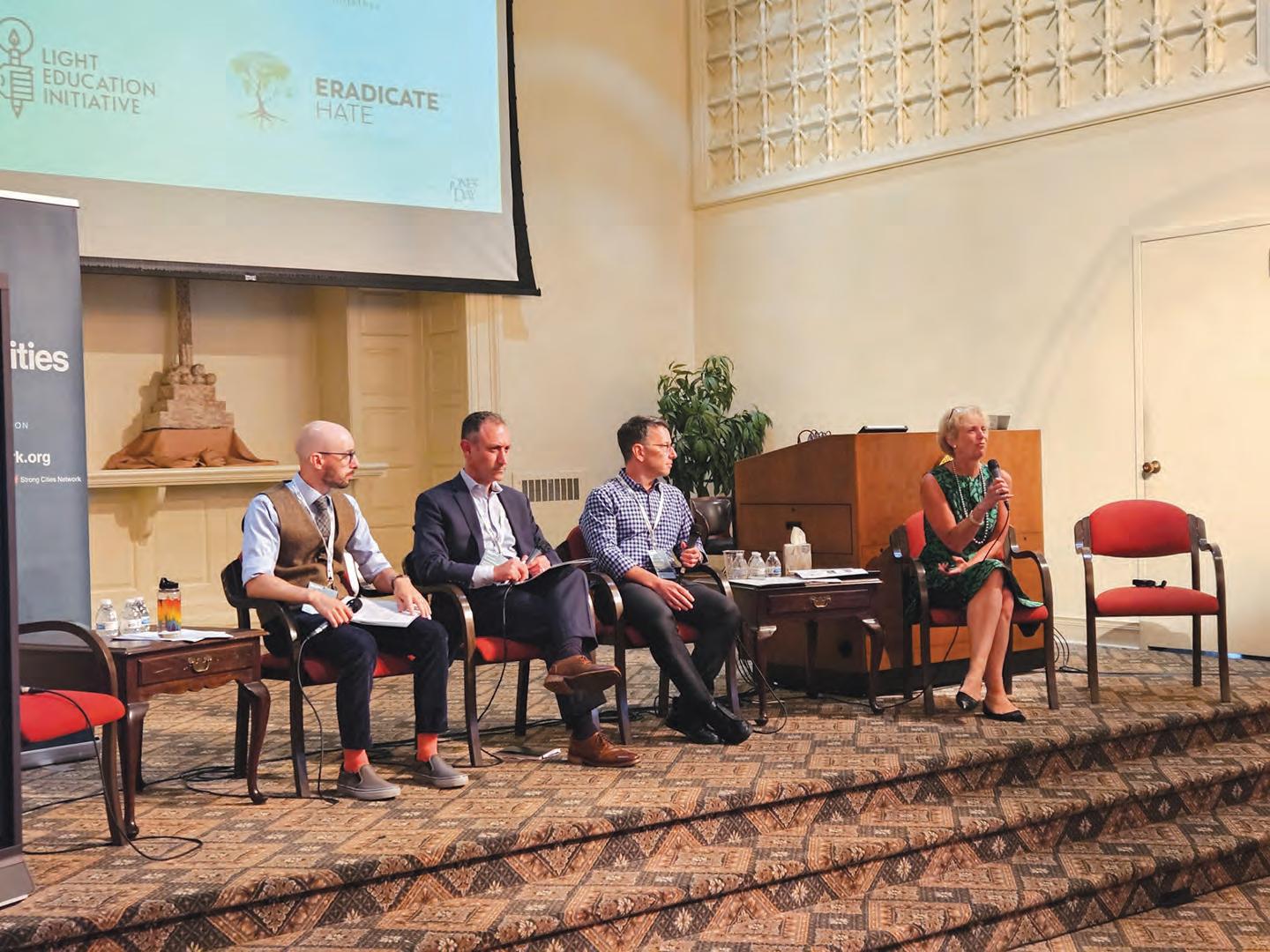
After Oct. 27, 2018, Bill Peduto needed to heal.
Following the Pittsburgh synagogue shooting, the then-Pittsburgh mayor was looking for a way to change the narrative of the city he loved from the home of the worst antisemitic attack in United States history to a place working to find a solution in the fight against hate and extremism. His search led him to Strong Cities Network.
The organization is an independent global network of more than 240 cities dedicated to supporting local government-led efforts to prevent hate, extremism and polarization.
For Peduto, the network’s goals of dialogue, discussion and finding ways toward peace seemed like the answer and, he said, have become his passions.
The former mayor became a senior advisor with the network and, less than a year after leaving office, was a speaker at the Peace Palace built by Andrew Carnegie at The Hague, Netherlands. The talk was turned into an illustrated film that was nominated for the best short animated film at the Cannes Film Festival.
In addition to his work with Strong Cities, while still in office, Peduto worked with mayors in Orlando, Florida, Parkland, Florida and Dayton, Ohio, all sites of mass shooting incidents, on a checklist for mayors to follow if they ever had an incident like the Pittsburgh synagogue shooting, and made it available through the U.S. Conference on Mayors to make sure it was accessible to every city.
In a 2023 interview with the Chronicle, Peduto said he wanted to expand the training to every U.S. mayor and one critical person and their staff across the country.
“I’m working to create the center for this new institute in Pittsburgh,” he said.
Peduto’s vision took a bold step
Communities First, A Retreat for U.S. Mayors and Other Local Leaders” at the Pittsburgh Theological Seminary.
The retreat featured more than 78 participants from across the United States and included leaders from various local governments, federal government departments, private and community orga nizations, religious organizations, think thanks and academics.
During the conference’s introduction, Strong Cities Network Executive Director Eric Rosand announced the formation of the organization’s North American Regional Hub.

Thirty member cities have joined the hub so far, whose initial focus is in Canada and the United States. Harkening back to what Peduto hoped to create, the hub and Strong Cities offer “local government leaders and practitioners a consistent and sustained resource to advance their prevention efforts and leverage the benefits of the global network,” according to literature published by the network.
Regional hubs will be operated by small, dynamic teams of local staff, harnessing the network’s global resources and expertise at the local level, accessing local perspectives, responding to specific city needs and engaging local stakeholders.
During the announcement, Rosand said the hubs will work across five pillars of activity: empowering mayors and elected local leaders; city-led action in prevention; peer-to-peer learning; partnerships for prevention; and response and data-driven threat analysis and mitigation.
The hyper-local focus Rosand discussed in his introduction to the retreat was on full display the first day of the program, which focused on the city during two sessions: “The Pittsburgh Prevention Model-Views from City Hall and Community-Based Organizations” and “Public-Private
included Pittsburgh Penguins Foundation Executive Director Yvonne Maher, Senior Vice President and Chief Government Affairs Officer at UPMC Alison Beam, Associate Director at The Andy Warhol Museum Dan Alaw and Allegheny Conference Chief Equity Officer Majestic Lane.
Acknowledging that Pittsburgh has one of the largest philanthropic communities in the country, the presenters each discussed how private organizations can help respond to hate and how partnerships between the local government and nonprofit organizations continue to evolve and serve the community.
Rosand said it’s this type of local focus that separates Strong Cities Network from other organizations working in the anti-hate space.
The fight, he said, isn’t only about hate but community wellbeing and resilience.
“It’s the core things that cities do, whether it’s violence prevention, working in school on anti-bullying, digital literacy, that’s not linked to a specific incident, but creates the foundation for resilience and social cohesion,” he said.
Rosand said that after the Pittsburgh synagogue shooting, Peduto saw the value in getting all parts of the city involved — and leveraging the strong sense of community across the city that long pre-dated the attack — and has been instrumental in the idea of
not just to host the retreat in Pittsburgh, the home of television’s Mister Rogers, but on the campus Pittsburgh Theological Seminary, where Fred Rogers attended and was ordained. He said Strong Cities will be returning to the campus for follow-up retreats over the next three years as part of its strategic partnership with the seminary.
“Bill [Peduto] is passionate about it,” Rosand said. “He thought a great way to get more cities and mayors invested in this endeavor is by showcasing not just a single initiative or effort but the way different parts of the Pittsburgh community have operated for many years, building these communal bonds and private-public partnerships.”
The retreat, sponsored by the National League of Cities, Eradicate Hate Global Summit, Pittsburgh Penguins Foundation, Carnegie Mellon University Heinz College and the Muhammad Ali Index, included a screening of the documentary “City of Ali” and nearly a dozen sessions, including “The Role of Faith Leaders and Interfaith Cooperation in the City-led Prevention and Response” and “Global Crises, Local Protests-Balancing Free Speech and Public Safety.” PJC
David Rullo can be reached at drullo@ pittsburghjewishchronicle.org.

‘High priest of antisemitic Christianity’ comes to Pittsburgh, meets with local politicians

By Toby Tabachnick | Editor
Rev. Munther Isaac — a Palestinian Christian pastor who gave a sermon on Oct. 8 preaching that Hamas’ deadly attack the previous day was a logical outcome of the creation of the state of Israel — came to Pittsburgh earlier this month to speak at the Islamic Center of Pittsburgh and the Bidwell Presbyterian Church.
The Aug. 1 events were hosted by Friends of Sabeel North America, a group criticized by the Anti-Defamation League for being behind various anti-Israel boycott campaigns in the United States. FOSNA’s website calls for the end of “Israeli occupation of Palestine” and an end to “U.S. policies that support and perpetuate the occupation.”
While in town, Isaac met Rep. Summer Lee, whom he referred to on Facebook as “a strong advocate for Palestine and a ceasefire in Gaza,” and Pittsburgh Mayor Ed Gainey.
Isaac posted photos of himself with Lee and Gainey on various social media platforms.
Neither Lee nor Gainey responded to the Chronicle’s requests for comment. Isaac posts frequently on X (formerly Twitter), accusing Israel of “genocide” and “colonialism.”
In his Oct. 8 sermon, Isaac said: “What is happening is an embodiment of the
injustice that has befallen us as Palestinians from the Nakba until now. Frankly, anyone following the events was not surprised by what happened yesterday … One of the scenes that left an impression on my mind yesterday, and there are many scenes, is the scene of the Israeli youth who were celebrating a concert in the open air [the Nova music festival] just outside the borders of Gaza, and how they escaped. What a great contradiction, between the besieged poor on the one hand, and the wealthy people celebrating as if there was nothing behind the wall. Gaza exposes the hypocrisy of the world.”
On Christmas Eve, Isaac, the pastor of the Evangelical Lutheran Christmas Church in Bethlehem in the West Bank, said in a sermon that “if Jesus were to be born today, he would be born under the rubble in Gaza.”
Rev. Johnnie Moore, president of the Congress of Christian Leaders, told Jewish Insider that “those of us who track these things know that Munther Isaac has long been the high priest of antisemitic Christianity; sadly, he spreads his hate from the city of Jesus’ birth.”
“Since Oct. 7,” Moore added, “Isaac seems to have graduated from being an anti-Zionist Lutheran preacher to a terror sympathizer. There’s really just no other way to describe him.”
Isaac not only was promoted by FOSNA on an eight-city U.S. speaking tour this summer. He was also given a platform by


Choosing a productivity suite shouldn’t be a lifetime commitment. We can help you migrate your data, shed your old platform, and grow into your new one as your business evolves and your needs change.



Submit calendar items on the Chronicle’s website, pittsburghjewishchronicle.org. Submissions also will be included in print. Events will run in the print edition beginning one month prior to the date as space allows. The deadline for submissions is Friday, noon.
SATURDAY, AUG. 17
Celebrate Tu B’Av, Jewish Valentine’s Day, by wearing traditional white clothes and enjoy a musical havdalah, a DJ, dancing, bar/bat mitzvah-style games, activities, a chocolate fondue bar, a photo booth and more. Bring or maybe meet your bashert at this Tree of Life young Jewish community and Temple Sinai NextGen event. This event is for adults in their 20s and 30s. Free. 8:30 p.m. forms.gle/rxjdQPPgvJZyTovm9.
SUNDAYS, AUG. 18–DEC. 29
Join a lay-led online parshah study group to discuss the week’s Torah portion. No Hebrew knowledge needed. The goal is to build community while deepening understanding of the text. 8:30 p.m. For more information, visit bethshalompgh.org.
MONDAYS, AUG. 19–DEC. 30
Join Congregation Beth Shalom for a weekly Talmud study. 9:15 a.m. For more information, visit bethshalompgh.org.
Join Temple Sinai for an evening of mahjong every Monday (except holidays). Whether you are just starting out or have years of experience, you are sure to enjoy the camaraderie and good times as you make new friends or cherish moments with longtime pals. All are welcome. Winners will be awarded
Giant Eagle gift cards. All players should have their own 2024 mahjong cards. Contact Susan Cohen at susan_k_cohen@yahoo.com if you have questions. $5. templesinaipgh.org.
WEDNESDAY, AUG. 21
Rendezvous in Rodef Shalom’s Biblical Botanical Garden with drinks and hors d’oeuvres for a free live performance with Doug Levine and Cantor Toby Glaser. 6:30 p.m. 4905 Fifth Ave. rodefshalom.org.
WEDNESDAYS, AUG. 21–DEC. 18
Temple Sinai’s Rabbi Daniel Fellman presents a weekly Parshat/Torah portion class on site and online. Call 412-421-9715 for more information and the Zoom link. Bring the parashah alive and make it personally relevant and meaningful with Rabbi Mark Goodman in this weekly Parashah Discussion: Life & Text. 12:15 p.m. For more information, visit bethshalompgh.org/life-text.
WEDNESDAYS, AUG. 21; SEPT. 18; OCT. 16; NOV. 20; DEC. 18
Join AgeWell for the Intergenerational Family Dynamics Discussion Group at JCC South Hills the third Wednesday of each month. Led by intergenerational specialist/presenter and educator Audree Schall. The group is geared toward anyone who has children, grandchildren, a spouse, siblings or parents. Whether you have family harmony or strife, these discussions are going to be thought-provoking, with tools to help build strong relationships and family unity. Free. 12:30 p.m.
FRIDAY, AUG. 23
Join Tree of Life Congregation as they celebrate the
welcoming of Shabbat. Meet before Shabbat begins to greet one another in the beautiful Rodef Shalom Botanical Gardens for Shabbat on the Rocks. Free.
6 p.m. 4905 Fifth Ave.
MONDAY, AUG. 26
View “Dancing Without Their Timbrels,” photography by award-winning photographer Dale Lazar at the Rodef Shalom Congregation Jewish Museum. The art includes color and black-and-white photographs of dancers on the modernistic bridge in Netanya, Israel. The opening reception is Aug. 26, and the exhibition runs through Oct. 30. 6 p.m. Free. 4905 Fifth Ave. rodefshalom. org/dancers.
WEDNESDAY, AUG. 28
Join JFCS and 10.27 Healing Partnership for an artbased mindfulness program. The group will explore ways making art can help regulate the nervous system, promote playfulness and imagination, and connect us more deeply to our bodies, emotions, thoughts and worldviews. Attendees will come together in community to explore di erent art mediums, share our personal experiences and reflect on how art can influence us all. Free. 10 a.m. 10.27 Healing Partnership Suite, 3rd floor of the JCC in Squirrel Hill. Membership not required. Registration required. 1027healingpartnership.org/artin-community-3.
WEDNESDAYS, AUG. 28; SEPT. 4, 18
Chabad of Monroeville invites you to spend an hour playing mahjong and other games. Play, shmooze, learn a word of the Torah, say a prayer for Israel and, of course, nosh on some yummy treats. Free. 7 p.m. RSVP
is required: SusanEBurgess@gmail.com, or text or call 412-295-1838. 2715 Mosside Blvd. jewishmonroeville. com/mahjong.
TUESDAYS, SEPT. 3, 17; WEDNESDAYS, SEPT. 11, 25
Join Rabbi Hazzan Je rey Myers and Tree of Life Congregation as they take a new look at the High Holidays through the screening of the movie “The Adjustment Bureau.” 7 p.m. Free. Rodef Shalom Congregation, Levy Hall, 4905 Fifth Ave.
WEDNESDAY, SEPT. 4
Join Rodef Shalom Congregation for Biblical Garden Open Door Tours: docent-led tours of the congregation’s Biblical Botanical Garden the first Wednesday of the month. Free. Noon. 4905 Fifth Ave. rodefshalom.org/garden.
MONDAY, SEPT. 9
Join the 10.27 Healing Partnership for healing, consciousness-building forest bathing. Enjoy gentle walks through Pittsburgh’s parks while nurturing your connection to the natural world through reflective practices. 9:30 a.m. Free. Registration required. Walled Garden in Mellon Park. 1027healingpartnership.org/ forest-bathing-4.
THURSDAY, SEPT. 12
Join StandWithUs for its inaugural Pittsburgh Community Reception honoring Pittsburgh City Controller Rachael Heisler and featuring keynote speaker Lt. Col. (Ret.) Jonathan Conricus. 6 p.m. Early bird: $90; VIP: $250. Rodef Shalom Congregation, 4905 Fifth Ave. standwithus.com/pittsburgh-event-2024. PJC
protesters out of the occupied building, more than a quarter of the 112 people arrested were neither students nor faculty.
By Luke Tress | New York Jewish Week
Columbia University restricted access to its campus on Monday, a sign that the university is girding for a renewal of anti-Israel student protests as the fall semester is set to begin.
The university’s chief operating officer, Cas Holloway, said in a Friday statement that the campus would effectively be closed to members of the public starting on Monday. The official first day of classes is Sept. 3, though some schools’ orientation activities begin this week.
“This change is intended to keep our community safe given reports of potential disruptions,” Holloway said. “We are particularly concerned about non-affiliates who may not have the best interests of the Columbia community in mind.”
The restrictions will remain in place until further notice, Holloway said.
Columbia was an epicenter of the proPalestinian student protest movement last academic year, particularly at the end of the spring semester, as a protest encampment on campus set off a nationwide movement. Hundreds of students were arrested, particularly after protesters occupied a university building. Jewish students said the encampment created a hostile and antisemitic atmosphere.
Columbia began restricting entry to the campus soon after the outbreak of the Israel-Hamas war on Oct. 7. In the spring, the campus was closed off and surrounded by police, and Columbia canceled its main commencement ceremony.
While the protests were led by students, people unconnected with Columbia played a role in the unrest. When police cleared
Now, only those holding Columbia IDs and pre-registered guests may access the campus from a limited number of entry points.
In addition to the entry restrictions, Columbia is considering giving school security officers the power to arrest protesters, according to the Wall Street Journal. The New York chapter of the Council on AmericanIslamic Relations condemned the proposed move in a Monday statement, claiming its purpose was “to silence dissent.”
Eden Yadegar, a Jewish incoming senior at Columbia, said the entry restrictions were “a good-faith attempt at minimizing disruption, however I think it’s frankly naive.”
Student protesters could still sneak outside activists onto campus or bring them in as guests, said Yadegar, who was the president of the campus group Students Supporting Israel last year and will be on the group’s board in the fall. The restrictions also will not address off-campus protesters, who regularly gathered outside the campus gates last semester.
Yadegar wants to see the school enforce its disciplinary policies to tamp down and discourage protests that violated school rules, and get at what she called the “root of the problem.”
“Columbia has a real accountability problem. They have proven to us time and time again that they simply will not demand accountability for students and professors who repeatedly violate school policy,” Yadegar said, adding that protesters “have been empowered by the university’s inaction.”
Columbia’s Hillel and Chabad chapters did not respond to requests for comment. The Hillel building is also restricted to Columbia ID holders.
The university had opened the campus to the public in mid-July, but disruptive activism has continued over the summer. Last week, vandals defaced Holloway’s apartment building, splattering red paint around the entrance and painting inverted red triangles, a Hamas symbol, on its facade. The vandals also smashed a glass door, put up posters attacking Holloway and released insects inside the building, according to the New York Post.
Also last week, three Columbia administrators resigned after exchanging a series of derisive text messages that were seen as
antisemitic during a panel on campus Jewish life.
The student protesters have vowed to escalate their activities going forward.
In a statement last week, the student coalition leading the protests, Columbia University Apartheid Divest, hailed the Oct. 7 invasion of Israel and unrest in Bangladesh as models, and vowed to “continue to escalate until the empire crumbles.”
“We are Westerners fighting for the total eradication of Western civilization,” the group said. PJC


The Pittsburgh JewishChronicle
invites you to join the Chronicle Book Club for its Aug. 25 discussion of “House on Endless Waters,” by Emuna Elon.
Overview: “Renowned author Yoel Blum reluctantly agrees to visit his birthplace of Amsterdam to promote his books, despite promising his late mother that he would never return to that city. While touring the Jewish Historical Museum with his wife, Yoel stumbles upon footage portraying prewar Dutch Jewry and is astonished to see the youthful face of his beloved mother staring back at him, posing with his father, his older sister … and an infant he doesn’t recognize. This unsettling discovery launches him into a fervent search for the truth, shining a light on Amsterdam’s dark wartime history — the underground networks that hid Jewish children away from danger
and those who betrayed their own for the sake of survival. The deeper into the past Yoel digs up, the better he understands his mother’s silence, and the more urgent the question that has unconsciously haunted him for a lifetime — Who am I? — becomes.”
Your hosts
Toby Tabachnick, editor of the Chronicle
David Rullo, Chronicle staff writer
How it works
We will meet on Zoom on Sunday, Aug. 25, at 1 p.m.
What to do
Buy: “House on Endless Waters.” It is available at some area Barnes and Noble stores and from online retailers, including Amazon. It is also available through the Carnegie Library system.
Email: Contact us at drullo@pittsburgh jewishchronicle.org, and write “Chronicle Book Club” in the subject line. We will send you a Zoom link for the discussion meeting. Happy reading! PJC — Toby Tabachnick
By Adam Reinherz | Senior Staff Writer
BERLIN — A seminar predicated on promoting transatlantic ties, Holocaust memory and modern Jewish life raised more questions than answers for Germany Close Up participants.
The 26-person cohort, consisting of North American young Jewish professionals, included educators, graduate students, policy experts and this reporter. Led by Tsipy Gur, founder and executive director of Classrooms Without Borders, the group visited Munich, Nuremberg and Berlin between July 28 and Aug. 6.
Since 2013, hundreds of North American participants, including dozens of Pittsburghers, have visited Germany thanks to a partnership between CWB, a Pittsburghbased nonprofit, and the German Academic Exchange (DAAD).
Hours into the 2024 excursion Gur congratulated individuals for previous accomplishments but said selection was based on efforts yet to be performed.
“We do this for teachers because they are responsible for the future,” she said.
Similar sentiment was espoused by DAAD, which noted the seminar is subsidized by the German government’s Transatlantic Program and seeks to “encourage GermanJewish-North American dialogue.”
Participants apply for various reasons. The commonality is an investment made from all parties involved, according to Gur.
Mishmash in the mind
University of Pittsburgh graduate Melanie Silver, 22, joined the trip to better understand her family’s history.
Silver’s grandmother was born in 1941 and survived the war as a hidden child in Poland. Decades passed before the matriarch spoke about her childhood.
“That part of my family history has influenced so much of my life,” Silver said. Prior to becoming a Springboard Fellow at Hillel at Washington University in St. Louis, Silver was active in Young Judaea and Hillel Jewish University Center in Pittsburgh.
Silver applied for GCU in hopes of reconciling a tension.
“Growing up, Germany was not something we talked about as anything sort of positive. But when my friends all started studying abroad here, they came back raving about it,” she said.
The clash created a “mishmash” in Silver’s mind.
Not only was the country a place of both horror and enjoyment but its history was sandwiched: Germany’s present rests on the Holocaust’s heels. For Silver and fellow GCU members, walking tours, museum exhibitions, panel discussions and Shabbat services demonstrated vibrancy and a quest for democracy, but also confounding population totals.
In 1933, approximately 560,000 Jews lived

in Germany. By Sept. 1945 — after years of emigration and extermination — only 15,000 remained. About 200,000 Jews now reside in Germany; most arrived after the Soviet Union’s collapse.
“We discussed a lot on this trip about the good and the bad and how that makes people think,” Silver said. “I’ve only come away with more questions.”
After arriving in Munich, participants were given notebooks and pens and asked to record ideas. Throughout the trip, several individuals shared thoughts and photos on a CWB blog. Some years, participants use the blog to share poetry. Other years, individuals detail daily activities.
Like previous cohorts, this year’s group ranged in age and religious practices. Bus rides, train transport and meals together fostered dialogue and friendship. German guides Ulrike Koppermann and Katja Grosse-Sommer provided continuous support and insight throughout the seminar.
Gur considered Koppermann and Grosse-Sommer among the best she’s ever worked with.
Whether it’s visiting Dachau Concentration Camp Memorial Site or Track 17 Memorial in Berlin, the trip presents several challenging stops. Having reliable and thoughtful partners is critical, Gur said.
“So many non-Jewish people have put a lot of hours of work, and a lot of deep thought and reflection, into this program that helps ensure Jewish growth, Jewish continuity, Jewish community,” North Hills
resident and cohort member Jason Kikel
Kikel, 32, joined the seminar hoping to see a new Germany. Nine years earlier, he studied in the federal parliamentary republic.
Since then, much has changed personally and for the country, he said.
Kikel became a Polish citizen, voted in an election and began regularly consuming Eastern European news.
“I have an increased concern about what’s going on on Poland’s eastern border, with Russia, Belarus, and, of course, the war in Ukraine, just knowing that that’s kind of looming for all of Europe,” he said.
“I have a different interpretation of what Germany is about now and how it handles its past,” he added.
Within German schools, Holocaust education is mandatory. However, each of the country’s 16 federal states can determine its own curriculum, Deutsche Welle reported.
At some point in their education, most German students will visit a concentration camp, though only in Bavarian schools is the trip required, according to Euronews.
During GCU, participants visited Dachau Concentration Camp (which operated between 1933 and 1945) and House of the Wannsee Conference (where leading Nazi officials discussed the Final Solution). At both sites, participants observed children present.
Dachau recommends visitors be over 13 due to the site’s content. Wannsee suggests children be at least 14 when visiting the museum.
Germany’s quest for remembrance
— the country boasts nearly 2,000 memorial sites — prompts early awareness of the Holocaust. Still, questions remain regarding efficacy.
At the Memorial to the Murdered Jews of Europe (a Berlin-based site spanning 4.7 acres, consisting of 2,711 stelae), GCU participants saw children running across the sloping terrain and deftly moving between concrete slabs.
Provocative selfies, yoga on-site and jumping between stones prompted Berlinbased Israeli satirist Shahak Shapira to create a digital project in 2017 combining photos taken at the memorial with scenes from Nazi extermination camps.
The page, according to Shapira, was visited by more than 2.5 million people.
“The crazy thing is that the project actually reached all 12 people whose selfies were presented. Almost all of them understood the message, apologized and decided to remove their selfies from their personal Facebook and Instagram profiles,” he wrote.
Sarah May-Stein, 33, participated in this year’s cohort. May-Stein teaches world history at Pittsburgh Public Schools’ Brashear High School. Her curriculum includes the world wars and the Holocaust.
“I have a major focus on the governments, the actions the governments did and how those impacted people and led to the rise of fascism,” she said.
By the time May-Stein’s 10th graders enter her classroom they’re familiar with the Holocaust’s “gory horrible details,” she continued. “I want them to dive into what made this possible.”
May-Stein spent GCU photographing documents and places, questioning guides and jotting notes.
“This trip was tailored exactly to what I want to teach my kids, so they can be on guard and they can always question the government and think about how certain policies are going to impact people — maybe themselves, maybe other people,” she said.
In Pennsylvania, Holocaust education is not mandatory. A decade ago, Act 70 was signed into law, but the 2014 legislation only recommended Holocaust, genocide and human rights education.
Months ago, Pennsylvania state Sen. Doug Mastriano introduced a bill mandating schools offer age-appropriate education about the Holocaust, genocide and human rights violations. Though some lauded his effort, it raised alarms for some GCU participants because of Mastriano’s anti-immigrant sentiments.
Both in the U.S. and Germany, there’s an odd echoing occurring, Kikel said.
Seated in a Berlin office building, the North Hills resident noted the change in rhetoric surrounding immigration since he last studied in Germany in 2015.
“It does kind of mirror a conversation in American politics,” he said.
By Jacob Magid and TOI Staff
Awidely anticipated Iranian attack on Israel to avenge the assassina tions of senior terror figures may be staved off if Israel and Hamas manage to reach a long-sought cease-fire deal in Gaza when talks resume this week, President Joe Biden said Tuesday.
The comments came hours after Iranian officials told Reuters a promised retaliatory strike could be delayed to allow talks to progress, even as Hamas indicated it would not attend the negotiations and with a member of the Israeli delegation expressing doubt in the viability of the talks unless Prime Minister Benjamin Netanyahu expands the team’s mandate.
Negotiations for a cease-fire and hostage release deal were scheduled to resume in Qatar on Thursday, with U.S. media tors touting the summit as possibly the final opportunity to release the hostages captured by Hamas on Oct. 7, end the 10-month-long war in Gaza and avert the possibility of an all-out regional war with the involvement of Iran.

Visiting New Orleans for an appearance Tuesday, Biden was asked by reporters if he expected Iran to hold off on a retaliatory strike if a deal is reached.
“That’s my expectation,” the president replied.
But Biden also warned that achieving a cease-fire deal was “getting harder,” while expressing his resolve about securing an end to the hostilities.
“We’ll see what Iran does and we’ll see what happens if there is any attack. But I’m not giving up,” Biden said.
The U.S. State Department said on Tuesday that it was working to ensure that Hamas representatives attend the upcoming talks.
State Department spokesperson Vedant Patel said that Doha had assured Washington that it would “work to see Hamas represented” at the upcoming talks.
The terror group issued a statement on Monday indicating that it would not attend the meeting unless mediators coaxed Israel into agreeing to the updated proposal that the terror group submitted in early July in response to the U.S.-backed outline.
The offer saw Hamas cave on its longheld central demand that Israel commit upfront to a permanent cease-fire. The response from Israel came in the form of Netanyahu’s list of amended demands, which Hamas then rejected.
Despite speculation that Hamas might not attend the talks, Patel said the U.S. “fully expects these talks to move forward.”
Amid the efforts to finalize the long-anticipated deal, White House press secretary Karine Jean-Pierre told reporters aboard Air Force One that White House Middle East czar Brett McGurk would be traveling
to Cairo and Doha in the coming days, while special envoy Amos Hochstein would be visiting Lebanon in an attempt to avoid further regional escalation.
With an increased risk of a broader Middle East war, Iran has been involved in intense dialogue with Western countries and the United States in recent days on
After Iranian officials suggested earlier on Tuesday that a successful hostage deal could hold it back from direct retaliation against Israel, Jean-Pierre said the U.S. believes that “getting a cease-fire deal is the best way to de-escalate the tensions we’re seeing.”
After Iranian officials suggested earlier on Tuesday that a successful hostage deal could hold it back from direct retaliation against Israel, Jean-Pierre said the U.S. believes that “getting a cease-fire deal is the best way to de-escalate the tensions we’re seeing.”
The U.S. has been engaged in intensive diplomatic efforts to dissuade Iran from launching an attack against Israel for the July 31 assassination of Hamas leader Ismail Haniyeh, which it has blamed on Israel. Jerusalem has neither confirmed nor denied any involvement in his death.
Hezbollah, the powerful Iranian proxy terror group in Lebanon, has also vowed revenge for the assassination of top Hezbollah military commander Fuad Shukr near Beirut that same day, in a strike claimed by the IDF.
ways to calibrate retaliation, three Iranian sources told Reuters, who all spoke on condition of anonymity due to the sensitivity of the matter.
Several reports indicated Israel believes Iran intends to attack before Thursday’s renewed talks for a deal. The new comments appeared to signal that the attack would only take place after those talks, and only if they failed to yield what Iran deems to be sufficient results.
One of the sources, a senior Iranian security official, said Iran and allies such as Hezbollah would launch a direct attack if the talks between Israel and Hamas fail or it perceives Israel is dragging out negotiations. The sources did not say how long Iran would allow for talks to progress before taking action.
Prime Minister Benjamin Netanyahu’s
office announced last week that Israel would send its negotiators to Aug. 15 talks “to finalize the details of the implementation of the agreement framework,” after the U.S., Qatar and Egypt issued a joint statement demanding a deal be sealed and implemented without further delay.
A member of the negotiation team told Israel’s Channel 12 on Tuesday evening that there was no point in traveling to the talks if Netanyahu didn’t expand the
The parameters within which the Israeli team will be expected to conduct negotiations have yet to be decided on, and will be set in a meeting with the prime minister this week, according to the report.
Earlier this month, the Israeli delegation warned Netanyahu that it wouldn’t be possible to reach a deal with the new demands he issued in late July.
The widely reported demands — which Netanyahu has insisted are not new additions — were said to include a stipulation that IDF forces remain in control of the Philadelphi Corridor between Israel and Egypt; and added restrictions on the displaced people allowed to return to northern Gaza when fighting is halted.
Netanyahu’s office has repeatedly denied the reports, insisting that the prime minister had not changed any part of the U.S.-endorsed May 27 proposal that has been stuck in back-and-forth negotiations. Instead, his office said, he was merely providing “essential clarifications” to implement the original framework.
Defense Minister Yoav Gallant said on Tuesday evening that Israel was closely tracking its enemies as it awaits a potential attack.
“I am aware of the tensions and the great burden placed on the citizens of Israel. We are following what is happening, in Beirut, in Tehran, and in other places,” Gallant said during a visit to an IDF intelligence base in northern Israel.
“We are engaged both in removing the threats and preparing all possibilities, in order to be able to attack wherever we decide,” he added, according to remarks provided by his office.
The Mehr news agency reported later that Iran was holding a military drill in the north of the country, but did not specify if it was related to the country’s plans to strike Israel.
Some had anticipated that an attack could come on Monday night or Tuesday, when Jewish communities in Israel and around the world marked the Tisha B’Av, Ninth of Av, considered a day of mourning and calamity in the Jewish calendar.
While the day did not see any major attacks, Hamas terrorists attempted to fire two rockets at Tel Aviv for the first time in months, and Tuesday night saw around 40 rockets fired from Lebanon at northern Israel. No injuries were reported. PJC
Agencies contributed to this report.
US, British ambassadors skip Nagasaki ceremony after Israeli envoy’s presence is nixed The ambassadors to Japan from the United States and Britain snubbed a ceremony commemorating the 79th anniversary of the United States dropping a nuclear bomb on Nagasaki because the mayor of the city declined to invite the Israeli ambassador, JTA.org reported.
The mayor, Shiro Suzuki, said that the presence of the Israeli ambassador at the ceremony on Aug. 9 would have posed security risks, The New York Times reported.
The U.S. ambassador, Rahm Emanuel, who is Jewish and who has Israeli parents, told the newspaper that the explanation seemed disingenuous, noting that Israel’s envoy was present, without incident, on Aug. 6 at a similar ceremony at Hiroshima.
Suzuki recently called for an immediate cease-fire in Israel’s war with Hamas in Gaza, which Israel rejects without a deal to release hostages held by Hamas. The mayor has likened the suffering in Gaza to the bombing of his city, which his parents endured.
Nagasaki has kept Russia and Belarus off its invite list since Russia invaded Ukraine. Emanuel and the British ambassador, Julia Longbottom, both said in statements to the Times that placing Israel and Russia on the same plane was unfair, because Hamas launched the current war with an invasion, just as Russia had with Ukraine.
‘Squad’ member Cori Bush is defeated in St. Louis primary that drew millions in pro-Israel money Democratic Rep. Cori Bush, a member of the hardline left-wing “Squad” that is harshly critical of Israel, was defeated in a St. Louisarea primary race by an opponent who attracted millions of dollars in pro-Israel money, JTA.org reported.
The Associated Press called the race for Wesley Bell, the St. Louis County prosecutor on Aug. 6 as Bell led Bush 51.2% to 45.6% with more than 96% of the vote counted.
It was the second Democratic primary win for pro-Israel political action committees against a member of the Squad. In June, a similar coalition of groups spent $14 million to defeat New York Rep. Jamaal Bowman.
Ahead of the Missouri primary, political action committees affiliated with the American Israel Public Affairs Committee spent at least $9 million to defeat Bush, one of the first lawmakers to call for a cease-fire after Hamas launched a war with Israel on Oct. 7, and also a leader in efforts to defund aid to Israel. Progressive groups spent a smaller amount — though still in the millions — on behalf of Bush.
British Rabbi jailed in Ireland on charges of performing circumcision without a medical license
Ireland’s small Jewish community is in turmoil after a British rabbi who had been hired to circumcise local babies was arrested and charged with practicing medicine without a license, JTA.org reported.
The rabbi, Jonathan Abraham, was
Aug. 19, 1856 — Writer Michah
Joseph Berdichevski is born
Aug. 16, 2015 — Physicist Jacob Bekenstein dies
Physicist Jacob Bekenstein, who advanced efforts toward a theory of quantum gravity, dies of a heart attack at 68. He theorized that black holes emit radiation, a finding Stephen Hawking rejected, then confirmed.
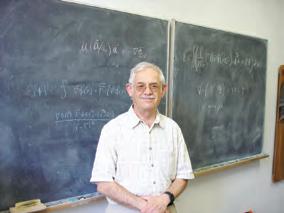
p Jacob Bekenstein, shown in his Hebrew University office in 2009, developed his theory about the entropy of black holes while working on his doctorate at Princeton University in the early 1970s.
Aug. 17, 1949 — Herzl’s body is reburied in Israel
The body of Theodor Herzl, buried in Vienna in 1904, is reburied with those of his wife and parents in Jerusalem. David Ben-Gurion calls the funeral “the triumph of a vision that became a reality.”
Aug. 18, 1994 — Intellectual Yeshayahu Leibowitz dies Yeshayahu Leibowitz, a controversial Jewish thinker and Israeli public intellectual, dies at 91 in Jerusalem. He advocated the separation of religion and state, arguing that the state corrupted religion.
arrested on July 30 and denied bail after a judge said that his 10 children and home base in London made him a flight risk. He faces up to five years in prison and a fine of up to $166,000.
Ireland’s chief rabbi, Yoni Wieder, confirmed that Abraham remained jailed as Shabbat began in Dublin on Aug. 2.
Earlier, Wieder issued a statement saying that he was actively working to support Abraham and to make sure that Irish Jews continue to have access to a ritual considered essential in Jewish observance.
“We and other relevant parties are doing everything we can for this man’s welfare and to ensure that traditional Jewish circumcisions can continue to be performed legally in Ireland,” Wieder said in the statement, also signed by JRCI Chair Maurice Cohen.
Jewish groups to sue Belgian columnist for ‘stab a Jew’ article
The Brussels-based European Jewish Association planned to file a lawsuit on Aug. 9 against a Belgium magazine columnist who wrote that he wants to “stab every Jew in the throat with a pointed knife” over the deaths of Palestinian children in the Gaza Strip, JNS.org reported.
The legal action comes after the incendiary remarks were published in a Belgian Dutch-language weekly on Aug. 4 and at a time when anti-Jewish hatred is escalating around the globe, including in Belgium.
“A red line has been crossed here which we will not accept under any circumstance and which we will fight with all our force,” European Jewish Association Chairman Rabbi Menachem Margolin said. “This is
both distinct antisemitism and incitement to murder.”
The offending piece, penned by Flemish writer and columnist Herman Brusselmans in Humo magazine, begins with a personal broadside against Israeli Prime Minister Benjamin Netanyahu, continues by citing a grossly falsified ratio of civilians to combatants killed in Gaza and then ends with talk of killing every Jew Brusselmans sees.
The magazine’s editors have asserted in the Belgian press that the column was written as satire and refused to apologize or run a retraction.
Israel’s recent visa waiver agreement with the United States has inadvertently created a pathway for BDS activists and far-left campaigners to enter the country, circumventing Israel’s longstanding policy against admitting boycott supporters, JNS.org reported.
Several radical activists were spotted engaging in controversial activities in Judea and Samaria in recent months, raising doubts about the efficacy of Israel’s border control measures under the new arrangement.
According to the framework signed between the two countries, American citizens are not required to obtain a visa in advance. The United States demanded that Israel provide unrestricted entry to Americans, regardless of their background. The main goal was to allow Palestinians with American citizenship to enter and exit the country, but the loophole also enabled entry for anti-Israel activists.
— Compiled by Andy Gotlieb
Scholar and writer Michah Joseph Berdichevski is born in Ukraine. He writes in Yiddish and German but is best known for his Hebrew work, including a debate with Ahad Ha’am about Hebrew literature.

p Michah Joseph Berdichevski spent the last years of his life compiling Jewish folklore.
Aug. 20, 1920 — Yishuv publishes first medical journal
The first Hebrew medical journal in Palestine, Harefuah (Medicine), begins publishing quarterly through the Jewish Medical Association of Palestine. The Israel Medical Association still publishes it.
Aug. 21, 1982 — Troops arrive to oversee PLO withdrawal
American, French and Italian troops arrive in Lebanon’s capital, Beirut, to supervise the evacuation of about 14,000 PLO fighters through Sept. 1, a key goal of Israel’s invasion of Lebanon. Yasser Arafat leaves on Aug. 30 for Tunisia.
Aug. 22, 1952 — First Israel Bonds mission begins
The Development Corporation for Israel, known as Israel Bonds, brings 22 American Jewish leaders to Israel on a 15-day American Champions of Israel Bonds mission, the first of its kind. PJC


Continued from page 1
people of Gaza, and grants equal rights to every person living in the territories under Israeli control?”
In an interview with the Chronicle, Heisler noted that the city does business with many global industries connected to Israel in one way or another, including pharmaceutical, public safety, automotive, financial and energy enterprises.
“It could prevent us from carrying out basic city functions, like providing electricity, purchasing life-saving medications, buying protective equipment for first responders, and even fueling police vehicles, to name a few,” she said. “It would severely disrupt the city’s entire contracting process, causing tremendous inefficiency and creating a massive risk of financial waste.”
As an example, Heisler said that the city uses the financial software of JD Edwards, which is owned by Oracle.
“You will not be shocked to learn that Oracle does business with the state of Israel,” she said. “I made a joke last Friday that we’ll only be able to use Excel spreadsheets, and someone said, ‘Microsoft does business with Israel.’”
Heisler said verifying whether an entity does business with Israel would become a function of her office, something that couldn’t be done at its current capacity.
StandWithUs’ Julie Paris said that the referendum would “affect every Jewish institution, our universities, our synagogues and even individuals and families. Israel technology and connections between Pittsburgh and the
Continued from page 1
reportedly told the U.S. that if Hezbollah attacks citizens, Hezbollah will pay a “disproportionate price.”
Saber rattling is familiar regional behavior. This time, however, it feels like war is actually coming, explained former Pittsburgh resident Yisrael Klitsner.
“We don’t want that to happen. But it’s crazy, how much can you take of this?” he asked. “No matter how much you feel that you’re at your wit’s ends, I think there’s very much an understanding that we’re probably only at the beginning.”
Klitsner spoke by phone from Zermatt, Switzerland. Days earlier, he and 20 relatives — all from Israel — flew to Switzerland for a family vacation.
Dr. Lauren Wasser said she didn’t pack for the trip until the morning of their departure.
“We really didn’t think we were gonna get out. But we did,” she said.
Numerous airlines have canceled flights to Israel due to escalating regional tensions. Wasser, Klitsner and their family traveled on El Al. The Israeli airline continues operating.
“It’s a very weird time, but I also think that because it’s been such a tense 10 months, people understand that we can’t live in this heightened sense of stress and anxiety all the time,” she said. “It’s the summer. People are trying to focus on their kids, enjoy as much as they can and focus on the small stuff.”
state of Israel are strong. This is completely impractical and immoral.”
The referendum, Heisler noted, also violates state law.
That issue was also raised in Federation’s petition, which references 2016’s Prohibited Contracts Act, in essence, an anti-BDS Pennsylvania law that makes it illegal for companies contracted by the state to boycott or discriminate against Israel or companies doing business there.
The petition filed by the Federation also pointed out that the ballot referendum petition did not contain the name or address of the person filing it, something required by the city’s home rule charter.
Another issue raised by both Heisler and Federation is the referendum’s language about tax exemption.
“That is exclusively the responsibility of state and federal law,” Heisler said. “The city has nothing to do with that and is one of the violations of state law we cite.”
At a downtown news conference in front of the City County Building shortly after filing the petition to challenge the proposed referendum, Finkelstein noted that only two weeks had passed since antisemitic graffiti was painted at both Chabad of Squirrel Hill and the Federation.
“This referendum is the latest action against our community,” he said.
Finkelstein said that the proposed referendum violates the International Holocaust R emembrance Alliance’s definition of antisemitism, adopted by 43 countries around the world and more than 30 states because it requires a behavior from Israel not expected or demanded by any other democratic nation.
Federation would be negatively impacted by the referendum, he said, before noting that its work in Israel includes coexistence programs with Jews and Arabs, health and human services, support to Oct. 7 survivors and hostages’ families, as well as the support of agencies like the Israel Trauma Coalition.
“The circulators of the referendum claim that it’s not targeting a specific group; we believe it is actually their goal,” he said. “Just like when people say, ‘I’m not a racist’ and what comes out of their mouth is racist, when people say, ‘I’m not homophobic’ and then what comes out of their mouth is homophobic. It’s the same here.”
Speaking to reporters, Adelson, rabbi at Congregation Beth Shalom, explained that the news conference was occurring on Tisha B’Av, a fast day when the Jewish community remembers disasters and cataclysms in Jewish history, including the destruction of both Temples.
The proposed referendum, Adelson said, would make the Pittsburgh Jewish community less safe, noting that it would call into question whether the city could provide security for High Holiday services.
“We need the police to protect us,” he said.
Jeremey Kazzaz of the Beacon Coalition said the organization helped recruit volunteers to review the signatures on the petition and received offers of assistance from hundreds of people.
“We were met with an overwhelming response,” he said.
If he was encouraged by the response of the Jewish community, Kazzaz was equally bothered by the number of people from the mayor’s office and Democratic Party who

food. Several days ago, they ensured supplies were replenished.
Part of the challenge, he said, is that despite a sense of the apocalypse, “you still have to go to work.”
signed and circulated the petition.
“Attaching their name to a petition that targets the Jewish community in the way this did and would crush their own city government just seems wild to me,” he noted.
A partial list of those signing the petition includes Allegheny County Councilperson Bethany Hallam and her boyfriend Muhammad Ali Nassir, who uses the name Man-E, both of whom are members of the Allegheny County Jail Oversight Board; Rep. Summer Lee’s field representative in Pittsburgh Kacy McGill; Morgan Overton, vice chair of the Allegheny County Democratic Committee; Mike Healey, ACDC solicitor; and Clara Weibel, Laura Byko and Dan Brown, who all serve on City Councilperson Barbara Warwick’s staff.
In a text to the Chronicle, Warwick said her staff members are free to engage in political activities during their off hours. She wrote that she found it “disconcerting” to be asked about them signing the petition, even though it would affect with whom and how City Council could do business.
“It is entirely understandable and human to want this war to end, to see the remaining hostages returned to their families and the unspeakable horrors being inflicted on the people of Gaza (and now increasingly the people of the West Bank) to stop,” Warwick said. “We do not all have to agree on how to get there.”
A hearing on the legal challenges to the referendum will be held on Monday, Aug. 19, before Judge John T. McVay. PJC
David Rullo can be reached at drullo@ pittsburghjewishchronicle.org.
Speaking by phone from Rehovot, former Squirrel Hill resident Raimy Rubin told the Chronicle that Hezbollah’s threats generated an “impending sense of doom.”
There are moments where “you feel like you’re in the middle of two things,” he continued. “Especially since Oct. 7, you feel like you need to think about everyday life
— whether work or family — and you feel guilty because you’re not thinking about the larger situation.”
Circumstances are “unnerving,” Klitsner said. “Nobody really feels like they can plan anything past tomorrow or next week.”
Wasser said she wasn’t sure their family would actually be together on vacation until the plane departed. Once it did, however, other feelings arrived.
“It was hard to leave because we were worried that something would happen, and most of our people are there,” she said.
Life proceeds but there’s obvious strain, Klitsner said.
“You can’t help but realize that it does take a toll, and where that toll is going to manifest itself is never clear. Is it going to be an outburst on your kids? Is it going to be on your general vels of anxiety and productivity? It’s just, it’s all over the place,” he said.
litsner has managed the period because of a “very strong nucleus that supports me, and I support them and we’re there for each other,” he said. “But I know for a fact that that’s not the case for many others. There are many that are less fortunate.”
Wasser hopes American Jews continue offering support while recognizing the larger concern.
“This is not just an Israeli thing,” she said. ISIS-inspired teens just “tried bombing a Taylor Swift concert. This feels like a war on Western society and Western society seems split as to how they see that.”
Rubin, an ultimate frisbee player, told the Chronicle he’s been engrossed in news this week about the banning of Israeli Youth Ultimate Frisbee teams from the multi-day
European Youth Ultimate Championship. After traveling to the championship in Belgium, the Israeli teams were scheduled to play on an alternative field 25 minutes from the main competition site. The designated field, reported The Daily Signal, was vandalized with red paint reading “BOYCOTT ISRAHELL NOW!”
The Israeli teams were then told they could not play or attend the tournament.
A letter to participating teams said the decision to remove the Israeli teams was made following advice from the Ghent public authorities given “the current local and international unrest, threats and recent incidents. Decisions were based on Authorities holding concerns of high-risk disturbance of public order, a significant threat and the inability to guarantee safety at the event if all teams were to participate as planned.”
Rubin said the incident and inability to compete offer familiar pangs for many Israelis who are simply trying to enjoy everyday activities.
Two days before speaking with the Chronicle, Rubin and his wife held a halfbirthday celebration for their daughter.
“She was actually 4½ months ago, but she was complaining that she hasn’t had a birthday,” he said. “We felt like we needed it too. We needed a celebration, a reason to bake a cake and a reason to feel good, too.”
The half-birthday festivities went on with a cake and decorations.
“It felt weird,” Rubin said. “But it’s what you got to do.” PJC
Adam Reinherz can be reached at areinherz@pittsburghjewishchronicle.org.
Continued from page 5
right-wing talk show host Tucker Carlson, whom the Anti-Defamation League and others have accused of spewing antisemitic, homophobic and racist hate.
Carlson hosted Isaac in April for a 40-minute interview on X, asking Isaac about how the government of Israel treats Christians.
Carlson was criticized in the National Review for his rhetoric since Oct. 7 and for being “at the forefront of a loose campaign of social-media influencers trying to convince Christians to abandon
On Christmas Eve, Isaac, the pastor of the Evangelical Lutheran Christmas Church in Bethlehem in the West Bank, said in a sermon that “if Jesus were to be born today, he would be born under the rubble in Gaza.”
their support for Israel.”
“He took things to a new level this week,” the National Review reported, “by turning to Isaac for answers, and claiming, ‘If you wake up in the morning and decide that
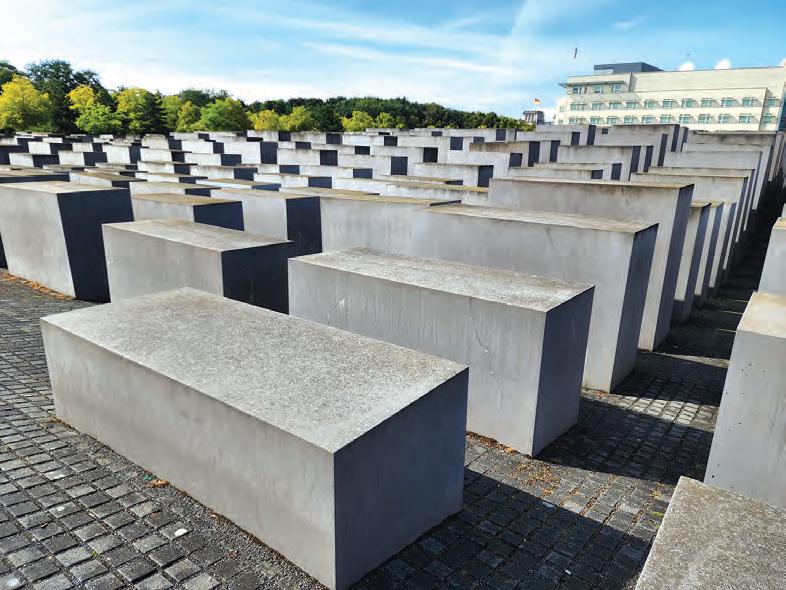
Continued from page 7 Isaac:
Days of future past
Former Squirrel Hill resident Josh Leib, 27, joined GCU in order to understand modern Germany’s approach to the past.
“It was a bonus to get a lot of the educational side, but the best parts of the trip have been seeing the historic recollection and reconciliation that the Germans are going through,” Leib said over a cup of coffee in a Berlin courtyard.
Leib studied history at Franklin & Marshall College.
“I was thinking about how meaningful the memorials have been on this trip, and how memorials I’ve been to previously in my life never struck the same chord,” he said.
A week into GCU, participants visited Track 17. The memorial at Grunewald railway station commemorates the deportation of approximately 10,000 Jewish citizens to extermination camps by Deutsche Reichsbahn (the German National Railway).
“Without the railway, and in particular without Deutsche Reichsbahn, the deportation of the European Jews to the extermination camps would not have been possible,” according to Deutsche Bahn.
Hovering mere feet from the rail ties
are steel plates detailing deportation dates, number of Jews carried and destinations, including Lodz, Auschwitz-Birkenau and Theresienstadt.
Track 17 was the only site GCU participants visited without a tour guide.
As the group quietly observed the memo-
your Christian faith requires you to support a foreign government blowing up churches and killing Christians, I think you’ve lost the thread.’”
Jonathan Elkhoury, a Christian Lebanese
refugee granted Israeli citizenship, told Jewish Insider that he was “appalled and ashamed” at Carlson’s choice to invite Isaac onto his show, preferring “rhetoric of lies and misinformation about Israel or its treatment of minorities” rather than “a voice that speaks about Christian life in the Holy Land.”
“Tucker Carlson should have taken his platform more seriously, and not invite political activists, in the disguise of a religious robe, to support the ongoing dehumanization of Israelis and the denial of the right of Israel to exist,” Elkhoury said. PJC
Toby Tabachnick can be reached at ttabachnick@pittsburghjewishchronicle.org.

Placed beneath glass were 15 pages of typed notes, compiled by SS officer Adolf Eichmann, detailing a 1942 meeting of leading Nazi officials.
“In the course of this final solution of the Jewish question, roughly eleven million Jews will be taken into consideration,” read
Germany’s quest for remembrance — the country boasts nearly 2,000 memorial sites — prompts early awareness of the Holocaust. Still, questions remain regarding efficacy.
rial, and heard nearby trains still running, rain fell. The drops caused printouts with passages celebrating dignity, democracy and a “respect” for human life to tear.
“I don’t know where in my head this came from,” but the experience prompted a memory, Leib said. “There was a line that I had read somewhere and wrote down and it was like, ‘And their sorrow was so great, the world wept.’”
The Pittsburgh Allderdice graduate said he’s still processing the visit.
Hours before ascending the memorialized platform, Leib and fellow travelers toured the House of the Wannsee Conference.
one document.
“Jews should be removed from the territory of the General Government as rapidly as possible because it is precisely there that the Jew constitutes an eminent danger as a carrier of epidemics and he also constantly disrupts the economic structure of the region through his continuous illicit trading,” read another page.
Before leaving the museum, Leib and this reporter stopped at an information stand.
A sign said, “Publications free of charge — please donate for survivors of Nazi persecution in Ukraine.” Numerous pamphlets lined the shelves. One
booklet contained a list of memorial sites. Another item featured a collection of photographs taken by the German Reich between 1938 and 1945. The pictures showed the final moments of persecuted people before deportation.
Carefully placed in front of the pamphlets was a pen bearing the Alternative for Germany party’s logo.
Originally founded to combat European Union bailouts in the early 2010s, AfD transitioned to opposing immigration following the 2015 Syrian refugee crisis.
Months ago, investigative journalists from Correctiv reported members of the farright party held secret meetings in 2023 to discuss plans for mass deportations of foreign-born Germans and those with German citizenship.
AfD is supported by 18% of German voters and stands to become the second largest party in parliament, according to an Aug. 6 report by Statista.
GCU participants retrieved the pen and delivered it to security at the House of the Wannsee Conference.
Printed on the instrument, adjacent to AfD’s logo, were the words, “Schreiben wir Geschichte.” In English, “We write history.” PJC
Adam Reinherz can be reached at areinherz@pittsburghjewishchronicle.org.
Guest Columnist
Jennifer Moses
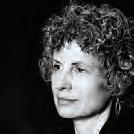
In 1968, a year after the Six Day War and nine years after my own birth, my parents went to Israel. It was their first visit to the Holy Land. Back home in suburban Virginia, my parents’ two-week absence was, for me, a nightmare, a bleak, lonely, unrelenting and seemingly endless blur of going to school, going to bed, and doing it all over again. Our babysitter was a devout Christian who insisted that we say our prayers to the Lord Jesus nightly, which made me hate her. Plus, she so flagrantly favored my one-year-younger brother over me and my sisters that I hated my brother for what I considered to be tantamount to the betrayal of the entire Judaic enterprise too.
The four of us went to a small private school favored by the Washington, D.C., elite. Four dark, curly-haired children whose faces mapped the entire history of the Jews and (with the exception of my brother) could not hit, throw or catch a ball if our lives depended
on it, surrounded by a sea of blond, blue-eyed, competitively athletic children — and OK, I’m exaggerating, but not by much. There were brown and gray-eyed kids too. Even so, we were among the token non-WASPs — a Black kid here, a Pakistani kid there and a handful of Jews spread out over nine grade levels. Because in our house we didn’t eat shellfish or pork products, a couple of girls in the grade above mine started calling me Piggy. To this day I don’t know if the nickname was affectionate or casually, if unconsciously, antisemitic.
The point is that for me it was hard to be a Jew in such a setting. Not that the place was a hotbed of prejudice or antisemitism, God forbid. It was more that I felt like such a weirdo there, so dark, so uncoordinated, so bad at the stuff that girls were supposed to be good at, and yes, so Jewish. Not because we were, in our house, kosher, nor were we anything like regular synagogue-goers. Only my father went to shul, and to do so he had to drive all the way into Washington, where he sat downstairs among the other men, while the incomprehensible Hebrew chanting, an utter mystery to the rest of us, wafted into his soul. It was more that, as assimilated as we were — and
we couldn’t have been more assimilated — the fact of our Jewishness was nonetheless front and center in such a way that made any future opt-out impossible.
And now our parents were in Jerusalem, eating hummus and grilled fish, while I was at home being looked after by a mean, blonde Bible-thumper, and regularly tortured at school by my own doleful and spazzy un-coolness.
And then, after an endless dark time, there they were: Mom and Dad, looking tanned and bright, their imaginations overflowing with the hope that was the Holy Land, and their luggage packed with presents for the kids.
I don’t remember what my brother’s gift was. To each of their three daughters, my parents gave a gold pendant inscribed with tiny flowers and Hebrew lettering. One of the pendants was oval, one round. Mine was in the shape of a teardrop, with enamel engraving and tiny flowers. My father explained that the Hebrew letters spelled “chai,” life. I wore it to school the next day. For me, it was a badge of pride: This is who I am, and if you don’t like it, that’s your problem.
I wore it almost every day until sometime around high school, when I started going in
for other kinds of jewelry — big silver earrings, turquoise beads. By then I was attending our town’s rough-and-tumble public school, and in the much bigger mix (540 kids to a grade), I didn’t feel quite so out-of-it, quite so appallingly different, so curly-haired, so unacceptable and so unfashionably semitic.
And then the decades passed during which my life happened, and though I continued to wear my chai necklace, it was never again an everyday event, like it had been when I was a Jewish child attending a private school surrounded by the largely Episcopalian children of Washington’s crème-de-la-crème. Until Oct. 7, that is. On that day, I put the necklace back on. I’m wearing it now. PJC
Jennifer Anne Moses is the author of seven books of fiction and non-fiction. Her journalistic and opinion pieces have been published in The New York Times, The Wall Street Journal, The Washington Post, the Chicago Tribune, The Atlanta Journal Constitution, The Newark Star Ledger, USA Today, Salon, The Jerusalem Report, Commentary, Moment and many other publications. This first appeared on The Times of Israel.
There was probably more than one reason why Vice President Kamala Harris chose Minnesota Gov. Tim Walz rather than Pennsylvania Gov. Josh Shapiro to be her running mate. It may well be that Shapiro rubbed Harris the wrong way in their interviews when she was auditioning potential candidates. The same factors that led Sen. John Fetterman to advise her against picking Shapiro might have influenced her. Shapiro does not have a reputation as a team player. His steady rise through Pennsylvania politics has been fueled by genuine talent as well as the sort of naked self-interested ambition that would have to be put on hold if he were to be the No. 2 in a campaign and an administration.

last 10 months. And like them, Shapiro supports proposals for a two-state solution to the Middle East conflict that is hopelessly out of touch with what Palestinians want. And all are critics of Israeli Prime Minister Benjamin Netanyahu.
But only the possibility of Shapiro being a heartbeat away from the presidency caused leftist magazines like The New Republic and Slate to denounce him for being “egregiously bad on Palestine.” As reports in The New York Times and other publications also made clear, his willingness to stand up on the issue in recent months was seen in a different light from that of other pro-Israel Democrats. The fact that he had rightly compared the pro-Hamas antisemites to members of the Ku Klux Klan, while Harris had voiced understanding and sympathy for them, was seen as disqualifying.
unacceptable to that crucial wing of the party. That put Harris in something of a dilemma. If winning the election and “saving democracy” from alleged threats by former President Donald Trump and the Republicans were primary goals, then Shapiro was her best bet. Naming him gave her the best chance of tipping Pennsylvania, where Trump has led for most of the year, back into the Democratic column. And his centrist approach would have expanded the Democratic coalition, giving it a better chance to win over independent voters who have also favored Trump this year.
Indeed, his gracious and respectful attitude to the victims of the attempted assassination of Trump in Butler last month struck a chord with both Republicans and Democrats at a time when most politicians seem determined to drive us further apart.
But there’s little doubt that the decision to bypass a popular governor who could have played a decisive role in winning a key battleground state that Harris must have if she is to beat former President Donald Trump in November wasn’t made solely because of Shapiro’s healthy ego. As we all know, that is a quality that hardly marks him as an outlier among politicians. Instead, it was his identity as a Jew and an unabashed supporter of Israel that sparked an ultimately successful campaign among Democrats to spike the Shapiro boomlet. His positions on Israel and the war on Hamas are not, in fact, very different from those of the other men Harris was considering, including Walz and Arizona Sen. Mark Kelly. They, too, support Israel’s right to exist and condemned the Oct. 7 terrorist attacks on Israel, as well as expressed concern about the pro-Hamas demonstrations that have become the hallmark of a surge in American antisemitism during the
Indeed, it got so bad that when an op-ed Shapiro wrote for his college newspaper in 1993 popped up, in which he voiced skepticism about the Oslo Accords and doubted whether the Palestinians would ever choose peace, he was forced to back away from it. Of course, everything he wrote at that time was subsequently proven correct. But when confronted with it, Shapiro acted as if it was a youthful indiscretion. “Something I wrote when I was 20, is that what you’re talking about? I was 20.”
This is an election in which leading Democrats believe they are going to need a united party with their left-wing activist base fully on board with the national ticket. That’s why President Joe Biden sent officials to bend their knees to Dearborn, Michigan, earlier this year to the pro-Hamas mayor of the city known as America’s “jihad capital.” Shapiro being an affiliated synagogue member who attended Jewish day school and sends his own children to them, as well as having a record of support for Israel dating back to his youth, made him
A Shapiro choice would also have shored up Jewish support in terms of both votes and campaign contributions. It’s not clear whether that would have won Harris any more Electoral College votes. But in a year when there are some signs that even the most partisan Jewish Democrats have been shocked by the way leftwing antisemites have been allowed to run amuck on college campuses and in the streets of U.S. cities spouting hate for Jews and Israel since Oct. 7, it would have sent a message to Jews that they still have a home in a Democratic Party, even though many in its left-wing base think that they are intersectional villains who are guilty of “white” privilege.
More than that, it would have given Harris a “Sister Souljah moment” like the one that Bill Clinton seized in 1992 when he criticized a Black artist for saying there was nothing wrong with Blacks killing whites, and in doing so, demonstrated both his centrist bona fides and a willingness to take on extremists within his own party.
But Democrats don’t believe in Sister Souljah moments anymore. Harris, who supported a fund that bailed out Black Lives Matter rioters in 2020, had no appetite for confronting the antisemitic, anti-Israel wing of her party. While there are still far more votes to be won in the pro-Israel center of American politics than on the pro-Hamas left, choosing the person that leftists have now dubbed “Genocide Josh” would have guaranteed dissension inside the Democratic National Convention in Chicago and riots outside of it.
Walz is no leftist, but he was definitely the most left-leaning of all the potential vice-presidential nominees that were finalists for the Democrats. That’s why members of the far-left congressional “Squad” and Socialist Democrats like Sen. Bernie Sanders celebrated Harris’ choice. Though Democrats are rebranding Walz as being no different from Shapiro in most respects, he’s clearly the favorite of “progressives.” He’s a supporter of the antisemitic Rep. Ilhan Omar, imposed draconian COVID-19 lockdowns on his state and dithered for three days before finally agreeing to the anguished pleas of Minneapolis Mayor Jacob Frey to send in the National Guard to stop Black Lives Matter rioters from burning down the city.
Walz is a capable politician, and there are some Democrats who think his experience as a Midwestern high school football coach is exactly the kind of résumé line that Harris needs to balance her reputation as a San Francisco liberal. It’s also true that most Republicans breathed a sigh of relief when they heard of her decision. Putting Shapiro on the Democratic ticket might not have guaranteed them victory, but it would have made the task for Trump and the GOP in battleground states a lot harder. That would have also been the case if Harris had picked Kelly, a former astronaut and U.S. Navy combat pilot with centrist appeal.
Please see Tobin, page 13
Last week, the Chronicle asked its readers in an electronic poll the following question: “Is anti-Zionism antisemitism?”
Of the 378 people who responded, 55% said yes; 38% said no; and 7% said they were not sure. Comments were submitted by 106 people. A few follow.
Denial of the right of the Jewish people to self-determination in our historical homeland, of the right to be a member of the family of nations, can only be antisemitism, even when it comes from fellow Jews.
Some anti-Zionist statements may contain antisemitic statements, but criticism of the state of Israel is not inherently antisemitic.
Depends on the intention of who’s using the term.
Holding the world’s only Jewish state to impossible standards that nobody else is held to is absolutely antisemitism. It’s just a shame that so many people fail (or refuse) to see that.
This really is dependent on how it is expressed. There are ultra-Orthodox Jews who are anti-Zionist in ideology who I don’t believe are self-hating. At the same time,
Tobin:
Continued from page 12
Had Harris chosen Shapiro, it would have signaled that she was determined to steer the Democrats back into the political center on not just Israel but other issues like school choice, though Shapiro’s stance on that topic is also anathema to the teachers’ unions that hold so much sway among Democrats.
A lot has changed since 2000
Above all, the rejection of Shapiro after he was bashed by so many on the left serves as a
when anti-Zionism is used against the Jewish community as a whole, it is being used in an antisemitic way.
Not all anti-Zionism is antisemitism, but for those who even understand the definition, I would bet that 98% who feel that Jews should not have a homeland also feel that Jews should just disappear entirely. Not all antisemitism is anti-Zionism, but I would bet that only 1% of those who dislike Jews for some particular baseless prejudice/ignorant
reminder of how much the Democratic Party has changed in the last 24 years.
At this moment, August 2000 seems like a very long time ago. When then-Vice President Al Gore chose Connecticut Sen. Joe Lieberman to be his running mate, the decision was hailed as a brilliant political move by the Democratic Party’s nominee. It both solidified the hold of moderates on the Democratic Party and marked the first time a Jew was named to a national ticket. Like Shapiro’s now, Lieberman’s views were liberal on most issues. But he was also a well-respected centrist Democrat as well as an observant Jew, whose piety and plain-speaking manner was admired by people of all faiths.
scapegoating/inferiority complex are OK with Israel existing — just so they can keep track of whom to blame for their problems.
Anti-Zionism is a political or religious issue. Antisemitism is discrimination against persons or a people. To combine the two is a form of discrimination in itself.
The veil has been lifted over the obscurity since Oct. 7. When the left attacks Jewish students on campuses from Harvard to UCLA, when they attack Jewish-owned restaurants, when they target Jewish — but not non-Jewish — politicians for supporting Israel, when they (attempt to) burn down or desecrate synagogues from London to Montreal to Seattle to Melbourne, can there be any doubt?
No. Anti-Zionism is opposition to the Zionist political movement, and to the state of Israel as a political entity due to its oppression of Palestinians, not a hatred for Jews or an opposition to Jewish peoplehood. As an anti-Zionist Jew, I don’t believe that we need an ethnostate or a demographic majority to be safe in Eretz Yisrael or anywhere else, and that maintaining such a system is immoral and incompatible with the principles of democracy and Jewish law. Referring to anti-Zionism as
As is true of almost all vice-presidential nominees, neither Lieberman nor his Republican counterpart Dick Cheney played a decisive role in determining the outcome of an election that was decided in favor of George W. Bush by a mere 553 votes in Florida. Lieberman’s nomination was a milestone in American history that seemed to prove that Jews were accepted virtually everywhere in the United States and could aspire to the nation’s highest offices without being subjected to antisemitic invective.
The attacks on Shapiro illustrate that this is no longer the case.
That is not to say that Shapiro has no future in national politics. Should Harris lose this year,
inherently antisemitic is creating a rift between mainstream Jewish institutions and the large number of young anti-Zionist Jews who represent the future of the Jewish people.
The struggle for Palestinian freedom from Israeli occupation is no different from other freedom movements against French or British occupation across the world. Palestinians aren’t simply antisemitic; they want to live lives in freedom, dignity and safety just like we all do. I am a Jewish organizer and I have never experienced antisemitism from Palestinian comrades. The focus on antisemitism is a distraction used to discredit the Palestinian liberation movement.
There have been anti-Zionist Jews since the inception of Zionism as a movement. Equating the two is obviously just a way to repress criticism of Israel.
It doesn’t have to be but it almost always is. PJC
— Compiled by Toby Tabachnick
Chronicle weekly poll question: Do you support the work of PACs to defeat “Squad” members at the polls? Go to pittsburghjewishchronicle.org to respond. PJC
he will immediately be classified as among the likely Democratic presidential contenders in 2028. Perhaps political fashions will shift in the next four years in a way that will ease his path. For now, though, it’s hard to imagine the Democrats picking someone who is considered a centrist as well as seen as a throwback to an earlier era when pro-Israel Democrats were the rule and Israel-haters were the exception in the party. PJC
Jonathan S. Tobin is editor-in-chief of JNS (Jewish News Syndicate). Follow him @jonathan_tobin. This first appeared on JNS.
All
I understand why some of my fellow Jewish Democrats are upset and disappointed that Kamala Harris chose Tim Walz to be her running mate (“Kamala Harris selects Tim Walz, pro-Israel Minnesota governor, as her running mate,” Aug. 9). I am a Democratic committeewoman in Squirrel Hill and a longstanding supporter of Josh Shapiro. I even stepped far outside my financial comfort zone to co-host a fundraiser in Pittsburgh when he launched his run for governor. I am beyond disgusted by the slurs launched against our brilliant and effective governor, some of them inarguably antisemitic, and I am pained by any traction they may have gotten. Nonetheless, I am thrilled that Vice President Harris chose Gov. Walz, and very proud of Gov. Shapiro for throwing his full support behind the team. I hope we all follow his lead.
Tim Walz is an impressive and accomplished public servant. Equally important, winning in November is the urgent goal of all Democrats and supporters of democracy, overriding every other consideration. I believe Harris/Walz will get us there.
I am more than fine with our next president being a woman of color, but let’s be honest: Many would-be voters are nervous. A white Christian man whom they — as well as those of us who share his values, though maybe not his religion or experience — can feel comfortable and identify with creates a winning ticket.
I’ll be delighted to support Shapiro for president in future.
Is there even a bridge?
Michele Feingold Pittsburgh
Ivan Frank’s letter “Fetterman has gone a ‘bridge too far’” (Aug. 9) presents a critical opinion about Sen. John Fetterman’s support for arms to Israel and the senator’s doubts at this time about the possibility and validity of a two-state solution. Mr. Frank’s criticism, and the premise of his
accusation that Fetterman has gone a bridge too far, is that Fetterman’s position enables and assists Israel’s right-wing government to avoid a cease-fire and provide aid to the Gazans, and a laundry list of other issues that the left always tosses out to try to show how bad Israel’s actions are.
I do not recall the senator saying he was against aid that supports Gazans or that he favors reoccupation of Gaza. Fetterman supports President Biden’s efforts to provide aid and reach a cease-fire. The senator has shown courage since Oct. 7 by saying this horrible situation ends if all the hostages are released and Hamas — the aggressor — surrenders.
The bigger issue is the false accusation that the lack of a two-state solution is due to an extremist right-wing Israeli government. After the murders, rapes and kidnapping of Oct. 7, which included many peace activists in Kibbutz Be-eri and other Gaza envelope towns, the majority of Israeli citizens question the possibility of a two-state solution. Hamas continues to show its commitment to the destruction of Israel and its bloodlust to kill Jews. Then there is the corrupt, dictatorial and two-faced Palestinian Authority, whose very survival is questionable if challenged by Hamas.
The issue is not a bridge too far, but rather, with Hamas and the PA in control, is there even a possibility to build a bridge for two states? Hamas destroyed the concept of seeking a path to a two-state solution.
We invite you to submit letters for publication. Letters must include name, address and daytime phone number; addresses and phone numbers will not be published. Letters may not exceed 500 words and may be edited for length and clarity; they cannot be returned. Send letters to: letters@pittsburghjewishchronicle.org or Pittsburgh Jewish Chronicle, 5915 Beacon St., 5th Floor, Pittsburgh, PA 15217 We regret that owing to the volume of correspondence, we cannot reply to every letter.

By Jessica Grann | Special
This is a refreshing salad that I can’t recommend enough, especially if your palate needs a reboot.
I mix ripe, firm avocado with sliced hearts of palm, Caprese tomatoes and my favorite
quick pickled red onions. There is no need for any oil, just fresh lemon or lime juice and the pepper of your choice. I’ve experimented a lot with different peppers and I especially like chili pepper with fresh lime juice. You could use paprika or sumac, but I always go back to Aleppo pepper for this simple but beautiful salad.
Choose ripe but firm avocados that will keep their shape well and not dissolve into
mush. Caprese tomatoes are the best option for this recipe. They stay intact and they don’t have as much water as other tomatoes, so there won’t be a pool of liquid at the bottom of the serving bowl.
I’ve previously published my quick pickled onion recipe to accompany Greek salad, and I include it again here. Those onions make everything more delicious, so it’s great to have a jar in the fridge. I add them to shawarma, kofte pita sandwiches and to fresh garden salads.
This is an easy recipe to adjust. It’s forgiving, so if you have a little less avocado than tomato, it still works out nicely.
Ingredients:
For the salad
3 medium-sized avocados, peeled and cubed — about 1 cup, more or less
Caprese tomatoes, about 1 cup quartered
Hearts of palm, 1 cup sliced
¼ cup pickled red onions (see recipe below)
Juice of half a large lemon or lime
Sprinkle of sea salt
Sprinkle of Aleppo pepper, chili pepper, sumac or paprika
For the onions
1 medium red onion, about ¼-inch wide slices; you can make these thinner if you prefer 1-2 teaspoons white sugar (more sugar makes the onion a little less sharp)
White vinegar to cover the onions
Prepare the onions first since they need a little time to marinate.
Peel a purple onion and cut it in half. Cut each half into slices of your preferred
width. Some people like these onions really skinny, but you can cut them into chunks if you prefer.
Put 1 teaspoon of sugar into a Mason jar, then add the sliced onions into the jar.
Cover the onions with white vinegar, place the lid on the jar and give it one shake to stir the sugar into the vinegar.
Let rest for a minimum of a half-hour before using. Onions can pickle at room temperature, but after an hour, put on a tight-fitting lid and refrigerate the jar.
Squeeze the lemon or lime juice into a bowl, then add the avocado chunks, gently stirring them into the lemon juice until the avocado is well coated. This will help the avocado not to brown. You can add a few avocado pits into the salad to help the avocado from discoloring, but it’s best to make this as close to serving time as possible.
Add the hearts of palm and quartered tomatoes to the bowl.
Remove a few pieces of pickled onions from the jar and chop them into smaller pieces.
Sprinkle the salad lightly with sea salt, stir well and taste a piece of avocado to see if it needs more salt. Salt to taste if needed and sprinkle the top of the salad lightly with about 1/16 teaspoon of your preferred pepper. I love this salad with grilled steak or chicken because the flavors just pop with the meat, but it also goes well with grilled or sautéed fish.
I hope that you enjoy this recipe as much as I do. Bless your hands! PJC
Jessica Grann is a home chef living in Pittsburgh.
By JNS Staff
The secrets of the Jewish kitchen dating back two millennia to the time of the Biblical Second Temple are being uncovered in Jerusalem’s ancient drainage channel, the Israel Antiquities Authority announced on Tuesday.
Items such as expensive oils, grape seeds and 2,000-year-old eggshells were unearthed during an excavation — outside the Old City walls — in the drainage channel that ran under Jerusalem’s main street during the Second Temple period.
The ancient drainage channel passed under the colorful markets of Jerusalem at the foot of the Temple Mount, and along the entire length of the City of David.
“Into the channel’s mouth were swept the detritus of the life above Jerusalem’s

• Meet with your student twice weekly for 30 minutes during the school day.
• Be part of an innovative pilot program that uses AI to create lesson plans tailored to your student’s progress.
• Choose from two locations: Catalyst Charter Academy or Clairton City Schools. Scan the QR Code to learn more and sign up for training or visit literacypittsburgh.org/impact-tutoring Questions? Email cgriffiths@literacypittsburgh.org
main street; where they remained preserved between the walls just as they were at the moment of the city’s destruction,” explained Ayala Zilberstein, excavation director on behalf of the IAA, which is carrying out the dig with funding from the City of David. “Small finds tell us a big story, from Jerusalem’s heyday of prosperity and splendor when its streets bustled with life, until the city’s ebbing moments during the rebellion against the Romans, and its total abandonment following the Temple and city’s destruction.”
In the upper layers of the soil, the excavators discovered remains from the days of the city’s destruction in 70 C.E., including complete pottery lamps from the Second Temple period. The soot preserved on their rims remains as a sign of the fire that once burned inside them.
As the archaeologists dug deeper, they uncovered finds indicative of Jerusalem’s splendor and wealth during the Second Temple period, the years during which the city hummed with never-ending activity, the IAA said.
“Through this large variety of pots and dishes that accumulated in the drainage channel, we encounter nearly the complete tableware set of Jerusalem’s residents,” Zilberstein said. “In contrast to the limited set of vessels generally found when excavating a single household kitchen, the

channel assemblage is drawn from many houses, and from different streets in town, thus presenting us with examples of almost all wares the city’s merchants had to offer.”
‘Connecting with history’
“In these days, when the word ‘destruction’ takes on more relevance than usual, there is great value, and it is important to look back into our past to remember where we came from and what we went through, to connect with our history, and thus gain a broader view of our life here in Israel,” said IAA Director Eli Escusido. “The great wealth of finds reveals to us a magnificent city full of life, which by its nature emphasizes the magnitude of the destruction and engenders our understanding of what was lost.” PJC




Tu B’Av (the 15th day of Av) is often referred to as the Jewish day of love. It falls this year on Aug. 18-19. Historically, it was a day of joy and a matchmaking day for unmarried women in the Second Temple period. While the holiday was almost unnoticed for centuries, its significance as a day of love was rekindled in modern times.
The Chronicle asked readers to share their own stories of love in celebration of Tu B’Av. Here are the submissions we received,
leaving our beloved Pittsburgh. Once again, I have been plagued by cancer. David is here providing me with his warm caring support daily. He is my No. 1 cheerleader for improving my health, along with my children and grandchildren.
For all of these reasons I am so proud and happy that I chose to marry him over 60 years ago. Through all the good times and bad he has proved to be the best husband ever and I shall always be grateful to God for creating this union.
Reesa and Joel Rosenthal

nd David had completed college to marry.
We both pursued our careers and were delighted when I became pregnant. However, unfortunately, our first preg nancy ended when the baby died at birth. David, while grieving himself, was my strong supporter, assuring me we would one day have the family we desperately wanted. The following year I gave birth to our son, Jim. David was a wonderful father and spent so much of his time with his son. He could be seen on the baseball field as Jim’s Little League coach. The same was true when our daughter, Marci, was born. He attended every activity she was involved in, whether it was cheering her on for the JCC swim team or her gymnastics team.
The people who are part of a Zionist Jewish movement (tnuat noar) go to a program that includes volunteering at a kibbutz, and then study at Kiriat Moria in Jerusalem. I was part of Hashomer Hatzair and he was part of Hanoar Hatzioni.
I am a year older than my husband; I made my Shabat achshara in 2000 and he went to Nir Itzhak with my younger brother in 2001. My mother, aunt and I thought visiting my brother in Israel was a good idea. When I met my husband, I saw a tall guy with a very huge Jewfro and a red-haired goatee. When the kvutza back to Mexico City, they started going out to bars, the movies and trajineras (a kind of boat) in Xochimilco. My brother and my best friend were there. They invited me everywhere.

We got married in 2012. It was a beautiful ceremony with around 300 guests, which is common for a Mexican Jewish wedding. Our honeymoon was in Playa Del Carmen, a beach on the Caribbean Sea, with an unexpected dinner and a Chabad sheba brachos
In 2015, our first daughter was born and in 2016 my husband was accepted to a doctorate program at Carnegie Mellon University. We have been living in Pittsburgh since then. In 2017 we were blessed with our second child.
In 2019 I started a master’s degree in inter disciplinary design at Chatham University. ow I’m working at the JCC as a graphic designer in its marketing department.
My husband’s birthday is on Aug. 13, 4 Elul, and this was a perfect opportunity to show him how much he means to me.
Michele: My husband and I met “on stage” in an operetta in which we were both performing. Though we came from very different backgrounds, we had the same values. I loved that religion was important to him. Later, he fully supported my long journey to becoming a Reform cantor. At 43 years, we are still going strong!
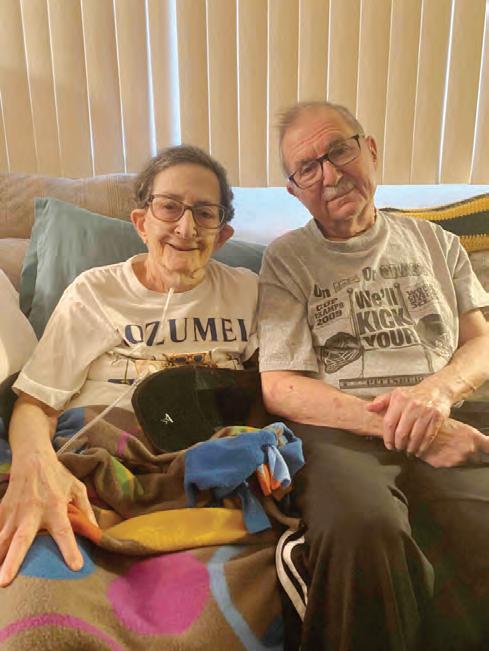
He is smart and patient and is my best friend, too. Sometimes I feel like I am a hurricane, because I’m energetic and very sensitive, but he calms me down and has the
Unfortunately, a few decades later I developed cancer twice. David was an awesome supporter, even suggesting “chemo dates” where he would bring a movie to watch during my long treatments. He became caregiver, housekeeper and overall protector of my health.
David also found time to serve his commu nity on numerous board committees and being president of several organizations at the same time. His grandchildren also became the center of his life as he role modeled his generous caring ways. Both Ian and Carly Caplan also became leaders in the Pittsburgh Jewish community!
As I write this, we have retired to Florida,

Our kids are on the autism spectrum, and sometimes I worry about their future. My husband is always positive and assures me that they will be independent and happy.
Before starting my master’s, I had postpartum depression, and he supported me in etting my master’s and applying for a job, even though our son was very young and the pandemic hit in the middle of my studies. This changed my life forever.
I am fortunate to have a loving husband, who is always willing to help me, the community and everyone around him. He’s a kind oul and my best friend and one of the
This story was taken, with permission, from a recording by Hillary Green, published on Story Corps Archive.
Brenda and Barry Werber have been married 51 years. Although they traveled in the same social circles, they only knew each other in passing, until they met one night at a bowling alley, where they were each bowling with different organizations. Barry, whose f irst wife had passed away, was dating someone else at the time — someone his mother did not approve of because of the way she treated Barry’s young son, Steve. (Steve passed away earlier this year.)
B arry drove Brenda home that night and they sat in the car in front of Brenda’s house talking for hours. The next morning, Brenda told her parents, “I think I met the guy I’m going to e relationship was sealed when the two met again at a singles’ dance held at Poale Zedeck, where they danced every dance together.
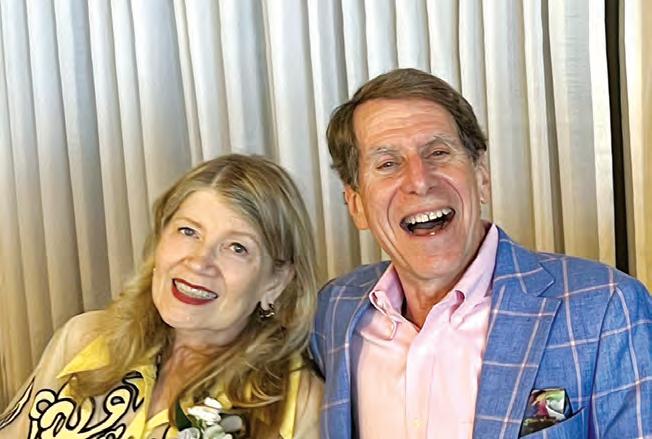
Barry’s mother was thrilled with Brenda because Brenda was so kind to
hen asked what about Barry has made her life more enriching, Brenda esponded, “His love for me, which he tells me every day almost.”
hen Barry was asked to thank Brenda for something, he responded, “Thank you for being you, for being the greatest mother my son could ever have and for accepting my faults as well as my good points. And I love you to pieces.” PJC
mezuzah in a Harris-Emhoff
It might not be the first.
— NATIONAL —
By Unitha Cherry, Louis Keene | Forward
Vice President Kamala Harris’ likely presidential nomination has Democrats dreaming of history: first woman in the Oval Office. First Jewish First Gentleman. First…White House mezuzah?
Second Gentleman Doug Emhoff hung a mezuzah — a decorative box containing biblical text — in the entryway of the vice presidential residence after he and Harris moved in there in 2021. And he suggested he’d do the same at the White House should his wife defeat former President Donald Trump in November.
“I’m just gonna keep living life openly as a Jew, and maybe there’ll be a mezuzah in the White House, just like there is in the vice president’s residence,” Emhoff said at a July 24 event with the Jewish Democratic Council of America.
But we still have questions. Would Emhoff take his mezuzah from the vice presidential residence? Where would he hang it? What does Jewish law actually require? And would this actually be the first White House mezuzah?
The Naval Observatory mezuzah
The Torah requires Jews to hang on their doorposts a mezuzah, which is simultaneously an aesthetic statement and — for many — an enchanted object; when a string of bad luck befalls a Jewish person, a common instruction is to check your mezuzah’s scroll for imperfections.
So when the Second Couple decided in 2021 to hang a mezuzah at the vice president’s mansion on the grounds of the U.S. Naval Observatory in Washington, D.C., they couldn’t just pick something out on Etsy. Instead, they enlisted Francesco Spagnolo, curator of University of California’s Magnes Collection of Jewish Art and Life, to find the perfect totem for their new home.
Spagnolo said in an interview that from the hundreds of mezuzahs in the collection he presented at least three options. Two came from India, which he thought might resonate with Harris, who is of Indian descent. Another had been a gift from Leah Rabin — wife of former Israeli Prime Minister Yitzhak Rabin — to Rabin’s Englishlanguage secretary, Alice Grossman. Its connection to the vice president, Spagnolo said, was “women in service.”
Emhoff and Harris selected the Rabin mezuzah, whose sterling silver, art nouveaustyle case bears a Hebrew benediction that translates to: “Blessed shall you be in your comings, blessed shall you be in your goings.”
“It’s a reminder of the transient nature of political power,” Spagnolo said. “There is a sense of coming and going and not just being there permanently. So all of these meanings are embedded in this object.”
As for the scroll containing the Shema prayer that goes inside the mezuzah? Spagnolo purchased it at a Bay Area Judaica store.

Generally speaking, halacha, or Jewish law, requires Jews to put up a mezuzah on every non-bathroom doorpost in any residence where they plan to live for at least 30 days, according to Rabbi Hyim Shafner, leader of Kesher Israel Congregation, an Orthodox synagogue just over a mile from the White House.
Of course, the White House comprises more than just a house; its West Wing and East Wing are office buildings. But in the Executive Residence alone — that’s the White House you see on postcards, and where the president’s family lives — there are 412 doors.
Whether halacha would consider Harris and Emhoff a mezuzah-mandated resident, though, is up for debate.
Rabbi Ari Zivotofsky, who writes about halacha for the Orthodox Union, seemed skeptical that Emhoff would be required to put up a single one.
Noting that the president does not acquire or lease the White House — which technically belongs to the National Park Service — he likened the Executive Residence to “a very fancy, fancy dorm room.”
In terms of halacha, a dorm resident does not have the status of a homeowner, or even an apartment tenant — their dorm fees cover housing, but not any particular room. And thus they are not required to affix a mezuzah.
Zivotofsky pointed out that as the spouse of Harris, Emhoff at the White House would be not only the guest of the National Park Service, but also the guest of the president herself — another degree of separation from ownership of the space. Therefore, he said, the mitzvah, or commandment, to put up a mezuzah at the White House would be purely optional.
Shafner said the First Couple’s residential status was irrelevant — and the Executive Residence was not different from a dorm room, which he insisted did require a mezuzah — because the students would be living and eating in the space for a period longer than 30 days.
It sounds like Emhoff is bent on putting one up in the Executive Residence if he gets the chance. Can he do that? Has that ever been done before?
The short answer is yes, the president’s husband can do that, though the Committee for the Preservation of the White House might suggest using two-sided tape, rather than screws, on the portico’s sandstone facade.
According to the White House Historical Association, while presidents and their families can make changes throughout the Executive Residence, they tend to make most of their changes on the second floor — their private quarters — leaving the first floor mostly intact.
So a Harris-Emhoff mezuzah might be the first one in the Executive Residence, but possibly not in the White House altogether. It depends on what you count as the White House.
We also found someone who hung a mezuzah in a building that might fairly be described as the White House complex during the Bush Administration — but who isn’t Jewish himself: Jim Towey, former head of the White House Office of Faith-based and Community Initiatives under President George W. Bush.
Towey, who is Catholic, knew about the tradition from Jewish roommates from law school. When he started a nonprofit serving the elderly in Tallahassee, he’d put one up in his office “as a reminder of God’s presence in
the midst of the work I was doing in support of human dignity.”
So when he got the Washington job in 2002 and moved into the building adjoining the Blair House — the historic guest house for presidential guests — putting up a mezuzah in his office, he said, was a “no-brainer.”
A clergy friend in Miami, the late Rabbi Solomon Schiff, sent him a two-toned brown mezuzah to use and instructions on how to hang it — the mezuzah should lean toward the inside of the room — but Towey could not remember who put it up.
“I remember I was given some instructions about how to angle it,” Towey said.
He took it with him when he left, and now the mezuzah hangs in his office in Tallahassee. Would he consider his old office next to the Blair House — which is a few hundred feet from the White House entrance — to be part of the White House?
“It depends on how technical you get,” Towey said. “It’s all staffing for the president. So I was part of the Executive Office of the President, and so it’s one of the offices of the White House. Mail sent to the White House got to me.”
Even if Emhoff’s mezuzah is merely the first in the Executive Residence, Shafner said Harris’ husband would be empowered to say a shehecheyanu blessing, to mark a new experience, along with the regular blessing for putting up a mezuzah.
And though he did not think it would be required, an optional mezuzah would still confer an important benefit for a president or her spouse: Every time you walk past it, Zivotofsky said, paraphrasing the 12thcentury Jewish sage Maimonides, “it reminds you that there is a higher power.” PJC
This story was originally published in the Forward. To get the Forward’s free email newsletters, go to forward.com/newsletters.

Stop in for new Pumpkin Babka and NEW Fall seasonal favorites!!
Explore Bagel Factory’s fantastic dog- iendly patio!
‘Comfort, comfort, my people’ (Isaiah 40)

This week, the Jewish world observed Tisha B’Av. Long dedicated to mourning the destructions of the First and Second Temples in Jerusalem, over time, numerous other tragedies in Jewish history also have been commemorated as part of Tisha B’Av’s rhythms, rites and rituals.

Advertising Trust Termination due to the death of Shirley P. Sacks on 05/24/2024.
Claims against said Trust may be filed as follows and sent to: PNC Bank, National Association
Attn: Sharon L Whitney
300 Fifth Ave, 31st Floor Pittsburgh, PA 15222
And/or: Joel Pfeffer, Esq.
Meyer Unkovic & Scott LLP
535 Smithfield St. #1300 Pittsburgh, PA 15222
Significantly, the Shoah is not commemorated on Tisha B’Av. This is because in 1951, the Israeli government declared Holocaust Remembrance Day to be observed on the 27th of Nisan, which was the day the Warsaw Ghetto Uprising began. Appropriately, the day’s full name is “Yom Ha’Shoah v’ha’Gevurah — Holocaust and Heroism Day.”
of comfort culminate on Shabbat Shuva, the Sabbath between Rosh Hashanah and Yom Kippur, a time for fully re-embracing life in a New Year.
Isaiah spoke to a generation that needed the reassurance that (a) they were neither abandoned nor alone in their grief, and that (b) comfort and healing were near at hand. Isaiah’s declarations are filled with imagery of valleys lifted, mountains made low, rough places smoothed and crooked places straightened. His vision symbolizes the profound healing possible for all of us, at any time, as we move from destruction to restoration and from despair to hope.
However, a midrash cautions that we should not understand God’s comfort as a passive gift. In this, “Nachamu, nachamu ami” is not merely an assurance that we shall be comforted, but is, in fact, a directive for us to be sources of comfort for others by supporting
The message is clear: Tisha B’Av may be a day of grief, but mourning is not a terminus; it is a transition. With Shabbat Nachamu, we begin moving forward, acting on our belief that even in our darkest times, there is a path to renewal.
We shall see how the Israeli people determine “to set aside for memory and purpose” what the world calls “Oct. 7” and what Jews around the world know in our hearts as the morning (mourning) of Simchat Torah.
Given our community’s lachrymose history, long ago we developed rhythms for communal commemoration and comfort. These rituals help us to remember by focusing our attention on what we love and long for, both as a nation and as individuals. And too, these same rhythms help us move forward from loss by reassuring us that comfort will come…one day.
This Friday and Saturday, immediately following Tisha B’Av, the Jewish world marks Shabbat Nachamu, the Sabbath of Comfort. Herein, we initiate a seven-week period of healing during which we share selections from the prophet Isaiah as haftarah “readings of consolation,” each offering a distinct aspect of Isaiah’s visions for a better time.
The message is clear: Tisha B’Av may be a day of grief, but mourning is not a terminus; it is a transition. With Shabbat Nachamu, we begin moving forward, acting on our belief that even in our darkest times, there is a path to renewal. Significantly, the seven weeks
and uplifting the people around us.
This message resonates deeply. Just as the ancient Israelites faced loss and exile, we, too, know the experience of betrayal, reversal and loss. The past two-and-a-half years have surely been a testament to this in my own life. At my lowest, dejected and lost, I struggled to find meaning in daily living. My solace was focusing on making life better for other souls and in simply being with those in even greater need; therein, I began to heal. It’s slow, but it’s real.
Friends have selflessly shared with me similar experiences; in these gifts, I know I am not alone. After all, who lives a life unscathed? Isaiah’s prophecy reminds us that reversals are not forever, renewal is always possible and true friends are precious beyond measure.
“Nachamu, nachamu ami — Comfort, comfort my people.” Indeed. PJC
Rabbi Aaron Bisno is the senior rabbi at Temple Ohav Shalom and the Frances F. & David R. Levin Rabbinic Scholar at Rodef Shalom Congregation. This column is a service of the Greater Pittsburgh Jewish Clergy Association.


F or home delivery, c all 412-687-1000, ext. 2

BARFIELD: Samuel “Papa Sam” Barfield, age 102, passed away peacefully on Tuesday, Aug. 6, 2024 in North Lauderdale, Florida. Beloved father to Ellen (Neil) Berger. Cherished grandfather to Freddie (Kirsten) Berger and Brad (Stephanie) Berger. Adored great-grandfather to Ellie, Henry and Rush Berger. Proceeded in death by his devoted wife, Rosalyn Barfield, and longtime companion Irene Zasloff. Son of the late Max and Ethel Barfield. Brother of the late David (Esther) Barfield. Sam was a true inspiration to all who knew him. Sam grew up in Pittsburgh and attended Peabody High School. After serving his country in World War II, he graduated from the University of Pittsburgh with a double major in pharmacy and biochemistry. He worked in medical research and was an accomplished pharmacist. Sam was a man of few words and simple pleasures. He was a religious man who loved his family, the Pittsburgh Steelers and reading his morning paper. Following his retirement he moved to North Lauderdale and quickly became a friend to everyone in his retirement community. Sam credited his long life to eating healthy food, wearing good shoes and to never stop moving. He was a fighter until the end and will be sorely missed by all who loved him. Graveside service and interment were held at Poale Zedeck Memorial Park. Contributions may be made to the American Diabetes Association (diabetes.org). Arrangements entrusted to Ralph Schugar Chapel, Inc. schugar.com
LEGNINE: On Aug. 8, 2024, Laura Joy Legnine (Kronzek), daughter of the late Joseph and Sylvia (Loikrec) Kronzek, passed away. Laura was a kind, gentle soul who leaves behind four loving daughters: Hillary Stein (Mario), Rebecca Masas (Israel), Elizabeth Costa (Michael) and Melissa Legnine. Laura was the proud grandmother of Maximus, Mali, Noa, Grace, Liel, Asher and Lily. Laura also leaves her adoring older sister Rochelle (Stephen), younger brother Jon, and beloved younger brother Evan Kronzek. Laura also had many close and cherished friends and extended family who will miss her loving, sweet nature and kind spirit tremendously. Services were held at Ralph Schugar Chapel, Inc., 5509 Centre Avenue, Shadyside. Interment Beth Shalom Cemetery. Contributions in Laura’s name may be made to the JCC of Greater Pittsburgh, 5738 Forbes Avenue, Pittsburgh, PA 15217. schugar.com

WALLACH: David Lee Wallach passed away on Aug. 11, 2024, after days of loving family visits, following a quick decline from a debilitating stroke. David is predeceased by his parents (Edward and Dorothy), and his beloved wife of almost 60 years, Carole Gerstacker Wallach. He is survived by his sister Paula Eppinger and sisterin-law Marcia Anselmo, children Beth Wallach, Dan (Joyce) Wallach, Deborah (Joseph) Busche, grandchildren Kaitlin Grabowski, Jonathan Wallach, Christine (Alex) Armstrong, Jackson and Damien Busche, step-grandson Dennis Hullihan, great-grandchildren Ty and Michael Grabowski and Brayden Armstrong, many cousins, nieces and nephews and their children, “extra daughters” Holly (Rich) Schmidt and Ann (Chris) Hall, and wonderful caregivers Corrine, Diane, Emily, Bobbie and Nora, among others. David was born on Aug. 21, 1940, in Cleveland, Ohio, and enjoyed a wonderful childhood, including much mischief and chemistry experiments of dubious safety. He graduated from Shaker High School in 1958, and then went to Rensselaer Polytechnic Institute. He didn’t graduate from Rensselaer because while home after his first year he met the love of his life, Carole, at a bus stop, when they were both attending summer classes at Western Reserve. After another year at Rensselaer, David transferred to Case to be near Carole. A few days after his graduation with a B.S. in physics in 1962, they married and used his years of paper route earnings to take a two-month honeymoon in Europe. They moved to the Pittsburgh area and David worked at Westinghouse-Bettis from 1962-1967, while attending night school at Carnegie Tech and earning a master’s degree in physics. He was a nuclear physicist at Westinghouse, involved in the first large-scale civilian nuclear power plant, and represented Westinghouse when its first nuclear submarine was powered up for the U.S. Navy. In 1967 he received an accidental lifetime dose of radiation in a small mishap at the Shippingport plant. This resulted in a new career in teaching physics, a field to which he was extremely well suited. He taught physics at Penn State, McKeesport campus, until 1998, achieving his Ph.D. in planetary science from the University of Pittsburgh in 1979. He also developed and taught a new course on the campus in astronomy. David was dedicated to making sure his students learned the material, providing caffeinated iced tea to ward off sleepiness, holding extra study sessions at his home on Sundays, mentoring students who approached him, and involving students in

Diane
Richard
Edward
Edith Kramer
Edith Kramer
Harold & Cindy Lebenson
Merrianne Leff
Susan Melnick
Robert Rosenstein
Sharon Snider
Eileen E Snider & Family Myron Snider
Dr Susan Snider & Family Myron Snider
Edris Weis .Saul Weis
Brenda Winsberg .Harry Winsberg
Sunday August 18: Sam Baker, Harry Davidson, George Freeman, Paul Allen Friedlander, Ruthe Glick, Sophia Mintz Latkin, Benjamin D Lazar, Tillye Shaffer Malyn, Mary Perilman, Margaret Racusin, Reva Rebecca Reznick, Katie Share, Ethel K Stept, Cora M Strauss, Morton A Zacks
Monday August 19: Anna R Brill, Sam Friedman, Sam Goldston, Mitzi Davis Marcus, Belrose Marcus, Samuel Morris, Samuel Natterson, Phillip Nesvisky, Jacob Pearl, Nathan Rosen, Mayme S Roth, Earl Schugar, S Milton Schwartz, Becie Sokoler
Tuesday August 20: Esther Bennett, Dr Simon Berenfield, J Richard Bergad, Frances Cartiff, Bertha Feldman, Solomon Kramer, Beverly Lebovitz, Abraham Leibowitz, Rose Lipser, Benjamin Plotkin, Samuel Sidney Sakol
Wednesday August 21: Jacob Friedman, Gilbert Murray Gerber, Helen Goldberg, Diana D Gordon, Robert Green, Anna Greenberg, Morris H Hirschfield, Herman Jacobs, Rae Labovitz, Morris Lebovitz, Robert Shapiro, Ruth F Zeligman
Thursday August 22: Sarah Bales, Adam Chotiner, Abraham Endich, Anna Friedman, Rose H Green, Eva Greenberg, Rebecca Gusky, Annetta Marks Horwitz, Marvin Klein, Isadore Mandelblatt, Tzivia Marbach, Milton Morris, Anna R Rosenbloom, Freda Barnett Safier, Cecilia Selkovits, Eleanor Ruth Simon, Louis A Skeegan, Myron Snider, Earle S Thall, Harry Winsberg, Esther M Wyner, Harry Zerelstein
Friday August 23: Sadye Bowytz, Julius S Broida, Bernard S Davis, Irwin Sowie Fein, Lester A Hamburg, Lois Hepps, Herman Hollander, Bessie Perr Miller, Esther Patkin, Theodore Somach, Gilbert Stein, Edward Stern, Rebecca Supowitz, Bella Weiner, Renee Weinstock
Saturday August 24: Sara J Ansell, Earl Barmen, Esther Caplan, Harriet L Cohen, Rebecca Lebenson, George Lisker, Joseph Siegman, David P Zelenski
















An unbroken chain of memory holds us together through the years and through the generations.
It’s Important To Pre-Plan. The Jewish Cemetery & Burial Association of Greater Pittsburgh (JCBA) welcomes inquiries about the purchase of burial plots in JCBA cemeteries.
It’s Important To Pre-Plan.
The Jewish Cemetery & Burial Association of Greater Pittsburgh (JCBA) welcomes inquiries about the purchase of burial plots in JCBA cemeteries.
Obituaries:
JCBA is committed to the proper care and maintenance of sacred grounds, and is devoted to the stewardship of Jewish cemeteries in Western Pennsylvania.
Please join us as we consecrate the headstone monuments to the memories of those buried in the last year at:
JCBA is committed to the proper care and maintenance of sacred grounds, and is devoted to the stewardship of Jewish cemeteries in Western Pennsylvania.
Chesed Shel Emeth Cemetery*
(JCBA’s Free Burial Cemetery)
Continued from page 19
498 Oakwood Street
Plots are available in the following JCBA cemeteries:
Shaler Township, PA 15209
Plots are available in the following JCBA cemeteries:
Agudath Achim – Beaver Falls
Agudath Achim – Beaver Falls
Agudath Achim – Hampton
Agudath Achim – Hampton
Anshe Lubovitz
Anshe Lubovitz
Beth Abraham
Beth Abraham
Machsikei Hadas
Sunday, August 25, 2024 11:00am
Machsikei Hadas
New Castle Jewish Cemeteries
New Castle Jewish Cemeteries
Poale Zedeck Memorial Park
Rabbi Seidman Officiating
B’nai Israel- Steubenville
B’nai Israel- Steubenville
Holy Society – Uniontown
Holy Society – Uniontown
Poale Zedeck Memorial Park
Rodef Shalom
Rodef Shalom
Shaare Torah
*Chesed Shel Emeth Cemetery is beautiful but can be challenging to navigate. Paved walkways are limited, the ground is steep in places, and it can be muddy. Please dress accordingly and bring assistance to walk the grounds if needed. If you have any questions, or would like additional information, please call the JCBA at 412-553-6469.
Johnstown Jewish Cemeteries
Johnstown Jewish Cemeteries
Kether Torah
Kether Torah
Shaare Torah
Tiphereth Israel - Shaler
Tiphereth Israel - Shaler
Torath Chaim
Torath Chaim
Workmen’s Circle #45
Workmen’s Circle #45
The Jewish Cemetery & Burial Association is the community’s response to a vital need— providing dignified burials to Jews in need and preserving Jewish cemeteries in accordance with our laws and customs.
We anticipate plot and burial fees at all JCBA cemeteries to increase in 2025.
We anticipate plot and burial fees at all JCBA cemeteries to increase in 2025.
For more information please visit our website at www.jcbapgh.org, email us a or call the JCBA at 412-553-6469.
For more information please visit our website at www.jcbapgh.org, email us a or call the JCBA at 412-553-6469.


For more information about JCBA cemeteries,
For more information about JCBA cemeteries, to volunteer, to read our complete histories and/or to make a contribution,









research (making sure they were listed as authors). He maintained lifelong relationships with several former students. He developed a curriculum and textbook for teaching physics for engineering technology students, who were not required to take calculus courses. He also co-authored the third revision of Frederick Bueche’s college textbook, “Technical Physics,” finding a number of mistakes as he worked through every problem in this textbook for its new solutions manual. David had a very active retirement, including two college teaching stints at Pitt and Washington and Jefferson, tutoring physics to high schoolers, and managing Carole’s psychology practice. Aside from family, his proudest achievement was writing and publishing his book “God and Science, Resolving the Paradox,” in which he synthesized his understanding of the Divine via both his scientific and religious perspectives. David was first and foremost a family man. A good son, he drove the family to and from Cleveland on many weeknights for a birthday dinner with the relatives. An amazing husband, he took care of Carole, through sickness and health until her death in 2022. He helped her develop her private practice and to realize her dream of traveling to all seven continents. And he stayed with her in the hospital for days at a time through Carole’s many health problems. An enthusiastic father, he built 6-foot high Lego towers and hot wheel tracks that spanned the house with his kids, fixed broken toys with great care, and served green eggs and ham ala Dr. Seuss. He chauffeured his children to their various lessons, and was a proud audience member at every performance. An adoring grandfather, he was an enthusiastic babysitter who always made the children feel special and valued. He served on the Peters Township School Board from 1979-1989, including in the role of president. David’s passion in life was helping people. From fixing strangers’ flat tires to canvassing the neighborhood for charitable contributions, from fixing the cars and appliances for the extended family to donating his valuable O-positive blood as often as possible, he always put others’ needs before his own. Judaism was a core part of his identity, and he was actively involved at Rodef Shalom Congregation, serving as president of Junior Congregation, and attended High Holiday services virtually as his mobility decreased. A remembrance of David would not be complete without mentioning his rescue cats — more than 30 friendly, spoiled, sweet cats across his adulthood. Visitors were greeted enthusiastically, and left with souvenir fur decorating their clothing. Educating until the end, David donated his body to medical science. Donations in David’s name may be made to the Washington Area Humane Society, the UPMC Alzheimer’s Disease Research Center (where he had been a research participant for nine years), or the United States Holocaust Memorial Museum. PJC





up on the right hand side of our

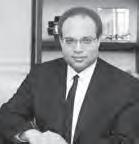





Smith-Rosenthal Team Jason A. Smith & Caryn Rosenthal Jason: 412-969-2930 | Caryn: 412-389-1695 Jasonasmith@howardhanna.com Carynrosenthal@howardhanna.com


Contact me today to discuss all of your real estate
Sherri Mayer, Realtor Squirrel Hill Office C: 412-760-0412 O: 412-421-9121x225 sherrimayer@howardhanna.com HowardHanna.com

pittsburghjewishchronicle.org
Sign up on the right hand side of our homepage. pittsburghjewishchronicle.org
up on the right hand side of our homepage. pittsburghjewishchronicle.org








































Did ‘The Scarlet Pimpernel’ inspire Raoul Wallenberg’s Holocaust heroism?
By Beth Harpaz | Forward
When a historian told me that “The Scarlet Pimpernel” inspired famed Holocaust rescuer Raoul Wallenberg, I was intrigued — but skeptical.
“The Scarlet Pimpernel” is the fictional tale of a foppish English nobleman who leads a double life saving aristocrats from the guillotine during the French Revolution. The definitive film version of the story came out 90 years ago, in 1934.
But it was remade in 1941 as an anti-Nazi propaganda film. The reboot, “Pimpernel Smith,” featured an eccentric archaeology professor who goes to Nazi Germany on a dig to explore Aryan culture. His real mission: rescuing concentration camp prisoners.
It turns out that remake is widely cited as the catalyst for Wallenberg’s courage. His half-sister, Nina Lagergren, told the BBC and a Wallenberg biographer that after watching “Pimpernel Smith,” Wallenberg said: “That is something I would like to do.”
Digging into the story, I found other Jewish connections. “Scarlet Pimpernel” producer Alexander Korda was a Hungarian Jew. The star of both movies, Leslie Howard, was a British actor (née Steiner), son of a Hungarian Jew.
I found Jewish pop culture links, too. The Jewish creator of Marvel Comics, Stan Lee, called Pimpernel “the world’s first superhero” because of the character’s secret identity. Jewish comedian Larry David quoted a poem from the story in an episode of “Curb Your Enthusiasm.” And a Daffy Duck spoof called “The Scarlet Pumpernickel” featured a $1,000 kreplach.
Here’s a look at the history of “The Scarlet Pimpernel” and its quirky Jewish afterlives.
The story, the play, the movies
“The Scarlet Pimpernel” originated as a short story by Emma Orczy, a Hungarianborn British writer and baroness. She and her husband turned the tale into a hit play that premiered in London in 1903 and ran for four years. Orczy also wrote a bestselling novel with the same title. (A pimpernel is a small roadside flower; Orczy’s hero used a red one in place of his signature.)
Orczy’s original story was full of antisemitic tropes, but the 1934 movie eliminated those references. (How could it not, with a Jewish producer and leading man?) The film was well received and cemented Leslie Howard’s reputation as a box-office draw. He went on to play Ashley Wilkes in “Gone With the Wind” and earned two Oscar nominations for other films. But with Hitler’s army steamrolling through Europe, Howard left Hollywood to help the war effort. Back in England, he started making antiNazi propaganda films, including “Pimpernel Smith.” Howard’s character outwitted and intimidated every Nazi he met — just as Wallenberg would do in real life.
Wallenberg’s derring-do
“Pimpernel Smith” was banned in Sweden for fear that it might jeopardize Sweden’s official stance of neutrality in World War II.

of people, Wallenberg rescued tens of thousands.
“The War Refugee Board didn’t want to hire him because he had no experience, but nobody else wanted the job,” said Eric Saul, the historian who put me on to the Pimpernel connection. Saul is also the founder of Visas for Life, which honors diplomatic efforts to rescue Jews. Wallenberg, he said, “arrived with a rusty pistol and thousands of dollars strapped to his body to bribe Nazi officials, and he was just thrown into the lion’s den.”
Between July 1944 and January 1945, Wallenberg carried out what the U.S. Holocaust Memorial Museum deemed one of the Holocaust’s “most extensive and successful rescue efforts.”
Wallenberg saved Jews from deportation by providing them with legal papers, jobs and safe houses; he used bribery and blackmail, and he even persuaded a Nazi official to release 200 Jews from a cattle car. He confronted and threatened anyone in his way, at one point telling Hungarian fascists pulling Jews from a building he’d rented in the Swedish government’s name: “This is Swedish territory … If you want to take them, you’ll have to shoot me first.”
‘Pimpernel’
The story of an ordinary person with a secret identity as a crusader for justice is a cliche in pop culture. But none other than Stan Lee, the Jewish creator of Marvel Comics, cited “The Scarlet Pimpernel” as the “first legitimate superhero movie.” In a 2018 videotaped interview, Lee said the protagonist “wore a disguise, but it wasn’t a mask or anything like that. He just didn’t let people know who he really was.” Lee’s own superhero creations included Spider-Man,
Another Jewish-themed link to Pimpernel, Looney Tunes’ 1950 “Scarlet Pumpernickel,” featured Daffy Duck (voiced by the Jewish actor Mel Blanc) pitching a movie to Warner Bros. Daffy’s convoluted pitch included a subplot about skyrocketing inflation exemplified by a $1,000 kreplach.
A more recent Pimpernel allusion popped up in the 2012 “Curb Your Enthusiasm” episode “Palestinian Chicken.” As Larry David struts out of the bedroom after hot sex with a gorgeous Palestinian woman, he begins reciting a slightly altered version of Pimpernel’s signature poem: “We seek him here, we seek him there, those Frenchies seek him everywhere. Is he in heaven? Is he in hell? That damned elusive Pimpernel!”
Perplexed “Curb” fans too young to recognize the reference sought explanations on Reddit. Explained one commenter: “The Pimpernel leads a double life and operates in secret, which probably chimes with Larry sleeping with the Palestinian woman.”
When my Forward colleague Louis Keene did a deep dive into “Palestinian Chicken” — said to be David’s all-time favorite Curb episode — producers told him David had rewatched “The Scarlet Pimpernel” the night before filming the episode.
In the final scene of “Pimpernel Smith,” the professor appears to be doomed, giving himself up to a Nazi general in exchange for a woman’s freedom. Of course, at the last minute, he outsmarts his nemesis and escapes.
In real life, neither Howard nor Wallenberg were so lucky. Howard died in 1943 when the Luftwaffe shot down the plane he was on. The attack violated protocols against striking civilian aircraft. Howard’s son and others believed the plane was targeted because of Howard’s antifascist activism. The wreckage was never found. Wallenberg also met a tragic and mysterious
fate. He was taken prisoner in January 1945 by the Soviets during their occupation of Hungary and never heard from again. Other former Soviet prisoners claimed to have seen him in the gulag over the years, but those reports were never substantiated.
Eventually Soviet officials claimed Wallenberg died in prison in 1947. But why he was arrested in the first place has never been fully explained. Was it a mistake, or did the Soviets view him as a threat or a spy?
Wallenberg’s family spent their lives and their fortunes searching for answers. False leads and stonewalling by Russian, Swedish and U.S. authorities during the Cold War only deepened the mystery.
“ The world abandoned the family, and abandoned him, for reasons that are inexplicable,” said Saul. “One of the reasons I’m so devoted to the study of diplomatic rescue is because of people like Raoul Wallenberg who risked everything.”
Yad Vashem, Israel’s memorial to the Holocaust, recognized Wallenberg as Righteous Among the Nations in 1963. Wallenberg’s mother asked the organization to refrain from planting a tree in his honor until after she died; she believed her son might some day return.
In 1979, she and her husband died by suicide, two days apart. Yad Vashem planted the tree later that year.
Did life really imitate art?
Could Wallenberg’s bravado, compassion and ingenuity truly have stemmed from merely watching a movie?
A 2009 Wall Street Journal story suggested that the seed for his activism was planted well before the film, when, on a 1936 business trip to Haifa, he stayed in a kosher boarding house and met a German Jew whose brother was murdered by the Nazis.
Wallenberg also had a Jewish greatgreat-grandfather. According to a 2014 biography, “The Hero of Budapest,” as a teenager, he once told a friend: “A person like me, who is both a Wallenberg and half-Jewish, can never be defeated.”
The case for the impact of “Pimpernel Smith” is further muddied by conflicting statements from Wallenberg’s half-sister. She’s the one who originally cited the movie as sparking her brother’s activism. In 2009, she backtracked, telling Richard Raskin, a professor at Denmark’s University of Aarhus, that it was “not the case that seeing ‘Pimpernel Smith’” inspired Wallenberg.
Yet Raskin was not dissuaded. “The remarkable rescue of countless lives in Budapest involved at least in part the transmission of a heroic model from Leslie Howard to Raoul Wallenberg,” Raskin wrote in an academic journal article. “There is every reason to believe that once committed to his mission at the Swedish legation in Hungary, Wallenberg found in Pimpernel Smith a role-model he could adapt to the situation at hand.” PJC
This was originally published in the Forward. To get the Forward’s free email newsletters, go to forward.com/newsletters.
Bring them home
Community members gathered on the corner of Darlington Road and Murray Avenue in Squirrel Hill to demand the release of an estimated 115 hostages. The Aug. 11 demonstration marked 310 days since the captives were taken to Gaza.
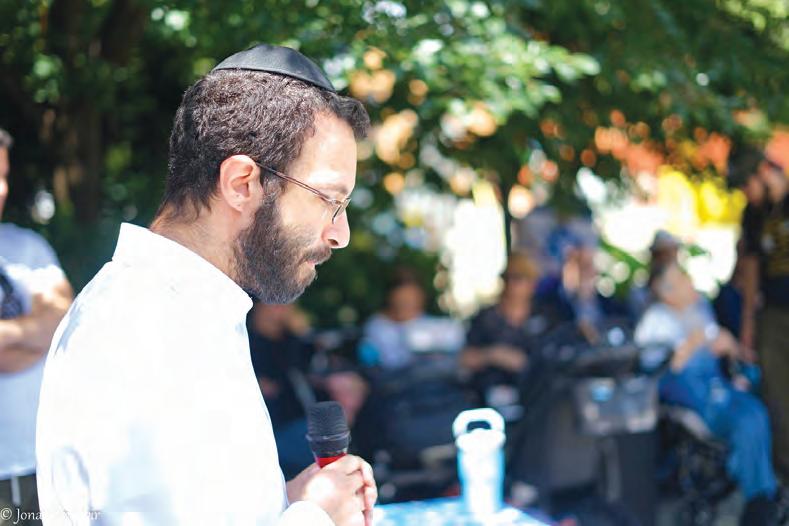






WEDNESDAY, SEPTEMBER 11
7:00-8:30 P.M.
JEWISH COMMUNITY CENTER 5738 Forbes Ave., Pittsburgh, PA 15217
PLEASE JOIN
JAN LEVINSON Chair of the Board
JEFFREY H. FINKELSTEIN President & CEO

DAVID D. SUFRIN
Emanuel Spector Memorial Award

SHAWN A. BROKOS
Doris & Leonard H. Rudolph Jewish Communal Professional Award
Register at jewishpgh.org/occasion/annual-meeting
Please register by noon, Friday, Sept. 6

Full inclusion is a core value of Jewish Pittsburgh. The Jewish Federation welcomes invitees of all abilities, backgrounds, races, religious affiliations, sexual orientations and gender identities. Call 412-992-5251 or email rray@jfedpgh.org to discuss questions or accessibility. The annual meeting is underwritten by a grant from the Lillian and Dr. Henry J. Goldstein Annual Meeting Endowment Fund of the Jewish Federation of Greater Pittsburgh’s Jewish Community Foundation.